Register for free to join our community of investors and share your ideas. You will also get access to streaming quotes, interactive charts, trades, portfolio, live options flow and more tools.
>>> Israel Has Seized More Land This Year Than in Any Year in the Past Three Decades
The Wall Street Journal
7-3-24
https://www.msn.com/en-us/news/world/israel-has-seized-more-land-this-year-than-in-any-year-in-the-past-three-decades/ar-BB1pm5Nf?cvid=59bb8ebe8c9d43fcfc0a2406a85f8b44&ei=31
TEL AVIV—Israel has declared control over its single-largest swath of land in the occupied West Bank this year, expanding its ability to build settlements in the Palestinian territory, as it pursues war in Gaza.
Jewish settlements in the West Bank are considered illegal by much of the international community.
The Israeli authority that oversees Israel’s military occupation of the West Bank said Wednesday it had declared an additional 5 square miles of the Jordan Valley to be Israeli state land, enabling Israel to allocate it for new settlements and other uses, and in practice, preventing Palestinian access. Israel’s Civil Administration published the order Wednesday, about a week after it was enacted.
Israel has declared a total of 9 square miles of West Bank land to be Israeli state land since the start of this year, according to Peace Now, an Israeli watchdog organization that tracks land seizures in the West Bank. That makes 2024 a record year for land seizures in terms of square miles since Oslo established a framework for a Palestinian state consisting of the West Bank and Gaza, Israeli officials say.
“Almost half of the lands that were confiscated [since Oslo] were confiscated this year,” said Hagit Ofran, who tracks settlement growth at Peace Now. “It’s huge.”
Since Oct. 7, Israel’s military has operated extensively to root out Hamas and other militant groups in the West Bank, following the attacks by the U.S.-designated terrorist group in southern Israel that killed 1,200 people, mainly civilians, and around 250 held hostage in Gaza, according to Israeli authorities. More than 500 Palestinians have been killed in West Bank violence since war broke out in Gaza, according to Palestinian health authorities, whose numbers don’t distinguish between civilians and combatants.
The Palestinian Authority exercises control over Palestinian-ruled areas of the West Bank in line with the 1993 Oslo Accords, the most-recent major peace deal between Israel and the Palestinians, which separated the West Bank into civil and security administrative regions.
The head of the Palestinian Authority’s settlement-monitoring commission said that the land seizures are designed to dispossess Palestinians. The move is “part of a large plan aimed at controlling the eastern part of the West Bank,” Mu’ayyad Shaa’ban, the head, said in a statement.
Israeli authorities say only land that isn’t privately held by Palestinians can be declared Israeli state land, but in practice, rights groups say many Palestinians have had their lands confiscated.
The latest land seizure is within an area administered by Israel, and is contiguous with Israeli settlements northeast of Ramallah, according to Peace Now.
Earlier this year, Israel seized about 3 square miles in an adjacent plot, Peace Now said.
Palestinians say that settlement expansion threatens a future Palestinian state, which they envisage as encompassing East Jerusalem, the West Bank and Gaza, because the settlements prevent the creation of contiguous territory.
Parts of the West Bank are administered by the Ramallah-based Palestinian Authority, a secular rival to Hamas and a candidate in some quarters of the international community to govern postwar Gaza. Israel’s Prime Minister Benjamin Netanyahu has said the Palestinian Authority, widely seen as corrupt and inept, is unfit to rule Gaza in its current state.
Still, Israel’s Defense Ministry has been quietly evaluating options to work with Palestinians linked to the Palestinian Authority to establish alternative options to Hamas in Gaza.
Israel’s pro-settler finance minister, Bezalel Smotrich, who is also in charge of West Bank civil affairs in the Defense Ministry, is opposed to the creation of a Palestinian state and acknowledges working to weaken the Palestinian Authority.
A person close to Smotrich said that while government policy can influence which land the office reviews for designation, the final decision by the Civil Administration isn’t taken by politicians.
Smotrich has created a new deputy role within Israel’s Civil Administration, under whom decisions tied to land designations are taken. The position is currently held by a supporter of the settler movement.
Last week, in a separate move, Israel’s cabinet decided to begin a process toward legalizing five Israeli outposts in the West Bank. “It’s definitely part of moving the settlement movement forward and opposition to the establishment of a Palestinian state” a spokesman for Smotrich said about the decision.
The United Nations alleges settlers from those outposts were behind 27 attacks on Palestinians this year. Separately, the U.S. has brought sanctions against some Jewish settlers this year for attacks on Palestinian homes in the West Bank
<<<
---
This post of mine is getting a lot of reposts...
I studied a lot of anthropology when I was young, so this sort of reasoning comes easily to me.
Let's be accurate "ZIONIST JEWS". Judaism is a religion and Zionism is a political affiliation. There are orthodox Jews of Semitic heritage who oppose Zionism. Generally speaking Zionist Jews are Ashkenazim, Not Hebrew. https://shorturl.at/oDHMX
Xena, They need elections soon to remove Netanyahu and his extreme coalition. Benny Gantz would be the logical choice to end the current insanity. Bibi needs to go to prison imo.
---
L'chaim...
Pray for these brave souls...
<blockquote class="twitter-tweet" data-media-max-width="560"><p lang="en" dir="ltr">As of now, Israeli Zionist police have started to intervene in the protest against the Israeli army in Jerusalem.<br><br>Since thousands of anti-Zionist Jews do not want to join the Israeli army, Israel is trying to recruit them by force.<br><br>25,000 Jews are protesting against the Zionist… <a href="https://t.co/0WZCE4A8mn">pic.twitter.com/0WZCE4A8mn</a></p>— Torah Judaism (@TorahJudaism) <a href="https://twitter.com/TorahJudaism/status/1807470258040803506?ref_src=twsrc%5Etfw">June 30, 2024</a></blockquote> <script async src="https://platform.twitter.com/widgets.js"; charset="utf-8"></script>
>>> Steakholder Foods Brings Sustainable Innovation to the U.S. with 3D-Printed Plant-Based Delicacies
PR Newswire
Apr 3, 20247
https://finance.yahoo.com/news/steakholder-foods-brings-sustainable-innovation-130000363.html
Steakholder Foods Introduces SHMeat and SHFish blends with Advanced 3D Food Printing Technologies after receiving approval from a highly regarded consultant for the ingredients of the SHMeat and SHFish blends in the United States market
REHOVOT, Israel, April 3, 2024 /PRNewswire/ -- Steakholder Foods Ltd. (Nasdaq: STKH), is excited to announce its innovative SHMeat and SHFish blends, designed for 3D-printing exquisite plant-based fish and steak alternatives.
A recent feasibility report prepared by highly regarded consultant confirms the legal status of the ingredients, marking a significant step towards sustainable and ethical food choices.
The comprehensive feasibility report confirms that all ingredients used in Steakholder Foods' SHMeat and SHFish blends are approved for use in the United States. Each ingredient has been carefully selected to ensure compliance with food safety regulations, and they have all achieved Generally Recognized as Safe (GRAS) status. This commitment to using only GRAS ingredients underscores the company's dedication to consumer health and safety.
Introducing SHMeat and SHFish blends
The company's flagship products, SHMeat Beef Steak blend and SHFish White Fish blend, are at the forefront of this innovation. These blends are crafted to mimic the taste and texture of traditional meat and fish, offering a guilt-free and environmentally friendly alternative for consumers.
Expanding the Plant-Based Horizon
Steakholder Foods is not stopping there. The development pipeline includes an exciting range of blends, such as:
SHMeat Beef Asado
SHMeat Beef Tenderloin
SHMeat Beef Flank
SHMeat Chicken Fillet
SHFish Salmon
Each blend is being carefully developed to ensure the highest quality and flavor, catering to a variety of culinary preferences.
Revolutionary Production Technologies
Steakholder Foods' production machines utilize two types of 3D technologies to mimic the texture of meat and fish:
Drop Location in Space (DLS): Used for fish and seafood production, creating delicate textures that closely resemble those found in real seafood.
Fused Paste Layering (FPL): Used for meat production, ensuring that the fibrous texture of meat is accurately replicated in the plant-based products.
These machines are designed and built to work in traditional food factories, matching the same scale production of the industry and are designed according to food safety standards set by the European Hygienic Engineering & Design Group (EHEDG).
It should be noted that the company is actively working to ensure that the production process meets the requirements of FSMA and Good Manufacturing Practices (cGMPs) and any other required regulation, as recommended by the consultant.
Seeking Partnerships to Expand the Future of Food
As Steakholder Foods makes its mark in the U.S. market, we are actively seeking partnerships with like-minded companies and producers. Our goal is to collaborate with those who are already established in the plant-based meat and fish alternatives sector, as well as traditional meat and fish producers who are looking to diversify and expand their product portfolios. Together, we can lead the charge in the food industry's evolution, offering consumers innovative, sustainable, and ethical food choices. We believe that through collaboration, we can achieve greater strides in making the future of food not only delicious but also beneficial for our planet.
Arik Kaufman, CEO of Steakholder Foods
"As we introduce our SHMeat and SHFish blends to the U.S. market, we stand at the cusp of a new era in food technology. Our advanced 3D printing technologies are not just a testament to innovation but also a commitment to sustainability and health. These products represent our dedication to providing consumers with food options that are not only delicious but also responsible choices for our planet. We believe that our entry into the U.S. market is a significant step towards a future where the food we eat contributes to a healthier society and a more sustainable world."
About Steakholder Foods
At Steakholder Foods, we are not just creating food; we are shaping the future of sustainable dining. Our innovative SHMeat and SHFish blends, developed through advanced 3D food printing technologies, are pioneering a new era of culinary excellence. With our flagship products like the SHMeat Beef Steak blend and SHFish White Fish blend, we offer a symphony of taste and texture that rivals traditional meat and fish.
Our proprietary Drop Location in Space (DLS) and Fused Paste Layering (FPL) technologies are the keystones of our production, allowing us to craft plant-based alternatives with unparalleled precision and quality. These technologies enable us to produce a variety of textures and flavors, from the delicate fibrousness of a white fish fillet to the robustness of a beef steak, ensuring that every bite is as satisfying as it is responsible.
Designed to integrate into existing food production lines, our machines are built to the scale of industry demands while adhering to the strictest food safety standards, as outlined by the European Hygienic Engineering & Design Group (EHEDG). This commitment to quality and safety is at the heart of everything we do.
Steakholder Foods stands at the vanguard of food technology, committed to providing delicious, sustainable, and ethical food choices. Our products are more than just alternatives; they are a testament to our vision of a world where indulgence and sustainability go hand in hand.
<<<
---
Rickards - >>> Next Middle East War Imminent?
BY JAMES RICKARDS
JUNE 18, 2024
https://dailyreckoning.com/next-middle-east-war-imminent/
Next Middle East War Imminent?
Had enough of the current Middle East war between Israel and Hamas in Gaza? Well, I hate to be the bearer of bad news.
But it’s time to get ready for the next phase of this war. The next Middle East war will also involve Israel. Except in this war, Israel’s guns will be pointing north toward Lebanon.
And it risks a much wider conflict, with Iran in particular. Let’s break it down…
Recent intelligence from a variety of sources points to an Israeli war against Hezbollah, which is an Iranian proxy.
Hezbollah is systematically attacking Israeli bases, radars, intelligence-collections facilities and other defense system components. Now the attacks are spreading to include Israeli settlements in the West Bank and Galilee. You’re just not hearing about it in the mainstream media.
These attacks have three effects: They break down Israeli military and intelligence systems, terrorize the civilian population and handicap Israel’s ability to conduct air attacks on Syria or Lebanon.
War on Multiple Fronts
The new war will be fought in the north of Israel. Additional fighting will take place in southern Lebanon, the area around the northern West Bank, the Golan Heights and the Sea of Galilee.
I’ve been in or near all of those places. It’s amazing how compact and close together it all is. It’s only about 40 miles from the Israeli border to Damascus and another 40 miles from the Golan Heights to the Mediterranean Sea.
It only takes minutes from takeoff to do a bombing run or a missile attack and perhaps only a day or two to move tank battalions depending on resistance.
Obviously, this state of affairs cannot be allowed to continue. Israel’s recourse is to stop playing defense and go on offense. That means massive air strikes on Lebanon and Syria, even at the cost of missile attacks on Israel.
Sunshine Patriots
The Israelis might be able to scrounge up some Patriot anti-missile systems from the U.S., but there are very few left because they’ve been sent to Ukraine.
By the way, the war in Ukraine hasn’t demonstrated the superiority of the Patriot. Far from it. It’s largely failed against Russia’s advanced, hypersonic missiles. These missiles have, in fact, taken out several Patriot systems.
If you were a foreign nation seeking defenses against hypersonic missiles like Russia’s Zircon and Kinzhal, would you really seek out the Patriot? Probably not. It’s just not that effective against the latest generation of missiles.
There’s some debate about whether or not these missiles are truly hypersonic. Practically speaking, it doesn’t really matter. The key takeaway is that the Patriot isn’t effective against them.
Iron Done
Air defense is the critical flip side of air superiority. The best information is that Hezbollah has devised ways to avoid Israel’s Iron Dome air defense system, most likely through the use of drones. Hezbollah has long had 10,000 or more missiles, mostly supplied by Iran.
In the past, Israel could rely on its Iron Dome to protect most major cities and many settlements.
That defense has now proved inadequate. You might recall that in April, Iran attacked Israel with hundreds of (mostly) drones and ballistic missiles in retaliation for Israel’s attack upon the Iranian consulate in Damascus.
Most of the incoming targets were shot down. The media touted that as proof of Israel’s excellent missile defenses.
But they neglected to inform you that a number of missiles penetrated Israel’s defenses and struck Israeli military/intelligence bases. This is the most heavily defended airspace in the world. But a number of Iranian ballistic missiles got through. Iron Dome is being referred to in the region as “Iron Done.”
Don’t think that Israel hasn’t gotten that message.
Two Can Play That Game
It’s not clear what specific type of ballistic missile Iran used to attack these bases in April. But what if Russia gives Iran even more sophisticated missile technology to use against Israel?
The U.S. and its NATO allies have authorized Ukraine to use the missiles they’ve supplied it with to strike targets inside Russia itself. That’s just more escalation, and Russia has warned about the consequences of that decision.
Despite what you hear in the mainstream media, Putin isn’t a crazy warmonger who wants war with the U.S. and NATO. That’s just propaganda. In reality, Putin is very calculated and cautious.
So any Russian retaliation probably won’t attack NATO countries directly. But just like the U.S. is using Ukraine as a proxy to attack Russia, Russia could use its own proxies to attack U.S. interests around the world.
After all, what’s good for the goose is good for the gander!
Russian Options
Supplying Iran with advanced missile technology that would threaten Israel, a key U.S. ally, would perfectly fit that proxy approach. Maybe Russia also gives the Houthi rebels in Yemen more advanced anti-ship missiles to target shipping in the Red Sea, potentially including U.S. warships.
The Houthis have been using drones and antiquated missiles based on technology from the 1960s. U.S. warships have been able to intercept most of them. But if Russia supplies them with advanced anti-ship missiles, that would change. These missiles would represent a legitimate threat to the U.S. Navy.
Russia could also arm proxies in Syria with advanced drones, for example, to attack U.S. forces based in Syria
Would that be an escalation? Yes. But it wouldn’t be a direct attack on U.S. interests. It would be an indirect attack through proxy, just like the U.S. is waging an indirect proxy war against Russia.
The larger point is that the war in Ukraine and the war in the Middle East cannot be neatly compartmentalized. They’re connected parts of a greater geopolitical conflict that’s taking place.
Conflicting Visions
It’s the old “rules-based” liberal U.S.-centric global order that’s prevailed since the end of the Cold War versus the emerging multipolar world led primarily by Russia and China.
The latter is represented by the rising BRICS+ nations that are forming their own bloc to counter what they perceive as U.S. arrogance and hegemony.
The bottom line is we could well be facing a new Middle East war, with global implications. It’s likely because Israel must go on offense to avoid being left without defense, which it will not accept.
Markets are not prepared for this wider war, but it’s probably coming soon.
<<<
---
Sounds interesting... we need GOOD AI - but somehow exploitation of AI needs to be prevented.
>>> Eco Wave Power Global AB (publ), a wave energy company, engages in the development of a wave energy conversion (WEC) technology that converts ocean and sea waves into clean electricity. The company also holds various agreements comprising power purchase agreements, concession agreements, and other agreements worldwide with pipeline of projects with approximately 404.7 megawatts. It has operations in the United States, Sweden, Israel, the British Overseas Territory of Gibraltar, Greece, Portugal, China, Australia, and internationally. The company was formerly known as EWPG Holding AB (publ) and changed its name to Eco Wave Power Global AB (publ) in June 2021. Eco Wave Power Global AB (publ) was founded in 2011 and is headquartered in Tel Aviv-Yafo, Israel.
<<<
---
>>> Netanyahu’s split with Biden and the Democrats was years in the making
The Washington Post
by Yasmeen Abutaleb, Steve Hendrix, Tyler Pager
5-26-24
https://www.msn.com/en-us/news/politics/netanyahu-s-split-with-biden-and-the-democrats-was-years-in-the-making/ar-BB1n4jWX?cvid=d6eb84bb3a9d4714edd224ba19453811&ei=27
When President Barack Obama hosted Prime Minister Benjamin Netanyahu in the Oval Office in 2014, the Israeli leader lectured him about Gaza’s future, a Palestinian state and an Iranian nuclear deal in a tone that Obama found condescending and dismissive.
After the meeting, an aide asked how it went. Netanyahu “peed on my leg,” Obama replied, according to two people familiar with the exchange who spoke on the condition of anonymity to disclose a private conversation.
The moment was emblematic of a dynamic that is culminating in the bitter debates over Israel now erupting across the American political landscape. Over the past 16 years, Netanyahu has departed sharply from his predecessors’ studious bipartisanship to embrace Republicans and disdain Democrats, an attitude increasingly mirrored in each party’s approach to Israel.
The war in Gaza has vastly accelerated the shift, as the once-broad support from Americans for Israel is shattering along partisan and generational lines. The divide, playing out in angry protests and Democratic debates, marks a fundamental shift in U.S. politics.
“I don’t think there’s any other way to say it: Netanyahu has been an absolute disaster for Israel’s support around the world,” said Sen. Chris Murphy (D-Conn.). “Here in the United States, Netanyahu made a reckless decision to integrate himself with the Republican Party, taking very clear sides in U.S. politics, and it has come with serious consequences.”
Netanyahu is not solely responsible for the shift. Israel has moved steadily to the right and the Democratic Party to the left in recent years, while memories of the Holocaust, which long undergirded Americans’ sympathy for Israel, have increasingly faded into the past. But Netanyahu has led the change with a strategy of aligning himself with the American right, former aides say — a decision that underlies his growing rift with Biden, who personifies the traditional Democratic affection for Israel.
The stakes for Israel could hardly be greater, as leaders on all sides agree that American military and diplomatic support is critical to the viability of the Jewish state as it faces powerful neighbors and a growing number of diplomatic challenges. The United States is by far Israel’s biggest backer.
Murphy, a member of the Senate Foreign Relations Committee, said he has personally warned Netanyahu several times over the past 10 years about the risks of aligning himself so closely with Republicans. The prime minister, he said, “has never wanted to listen.”
In the past, Netanyahu’s strategy was reflected in such moves as going behind Obama’s back to address a Republican-led Congress in 2015 to blast the president’s Iran policy, or signaling his preference for GOP presidential candidates Mitt Romney and Donald Trump. In the current conflict, his rejection of Biden’s pleas on delivering aid and protecting civilians have at times taken on an acid tone; a top Netanyahu cabinet minister recently went so far as to post on X, “Hamas ♥ Biden.”
Republicans, in turn, have rushed to highlight their embrace of Netanyahu and attack Biden over any sign of divergence from the prime minister’s policies. House Speaker Mike Johnson (R-La.) has said he plans to invite Netanyahu to address a joint session of Congress at a time of deep White House concerns about his policies. Rep. Elise Stefanik (R-N.Y.), a member of her party’s congressional leadership, recently traveled to Israel to assure members of the Knesset, Israel’s parliament: “There is no excuse for an American president to block aid to Israel.”
Some Israeli leaders are worried that Netanyahu is permanently wrecking the unified American support for Israel. Former Israeli prime minister Ehud Olmert, a onetime member of Netanyahu’s Likud Party, said in an interview that the current leader’s partisan strategy has “caused an erosion in the public support for the State of Israel.”
“I think that this is an acute threat to the basic needs of the state of Israel,” Olmert said. “Once we have threatened this consensus that both parties are equally important for us, once it starts to erode, it can be a very serious danger to what the American system, the American political bodies, will feel obliged to as far as Israel is concerned.”
The currents of Israeli and American politics are far too complex to attribute to a single person, even one as influential as Netanyahu, 74, who has served on and off as prime minister since 1996. In Israel, an array of social, political and security factors have pushed the country steadily to the right, ending its tradition of left-leaning leaders like Shimon Peres and Ehud Barak.
In the United States, Black activists increasingly identify with the Palestinian cause, even as they become a more important part of the Democratic Party and denounce Israel as a “colonial” entity. The Boycott, Divestment and Sanctions (BDS) movement began years ago to protest Israel’s handling of the occupied territories.
But nothing has shattered progressives’ sympathy for Israel like Netanyahu’s rhetoric and actions, Democrats say, particularly the high civilian death toll in Gaza and widespread hunger gripping the enclave because of severely restricted aid.
“Historically, Israel has always had a lot of support in the United States and around the world, and that’s because it was home to Jews who suffered unspeakable crimes during World War II,” said Sen. Bernie Sanders (I-Vt.), who is Jewish and lost relatives in the Holocaust. “But what I think is clear, especially among the younger generation, is the Netanyahu government’s war against the Palestinian people and their killing of tens of thousands of people … has significantly diminished support for Israel and especially among young people, which I think does not bode well for Israel’s future.”
Netanyahu’s office declined to comment for this article, though in the past he has publicly said Israel must be on good terms with both parties. A senior Israeli official, speaking on the condition of anonymity because he was not authorized to comment on the matter, said Netanyahu has always acted in good faith with American leaders.
“The prime minister has made good on every commitment he made,” the official said.
But Netanyahu’s divisive strategy has been evident for years to leaders in both countries. It emerged with particular clarity when Obama took office in 2009.
Michael Oren, Netanyahu’s ambassador to Washington at the time, said there were two schools of thought in the prime minister’s inner circle. Oren, who was in the minority, advocated nurturing ties with both Republicans and Democrats to ensure Israel had a strong relationship with all U.S. presidents.
The stronger faction — spearheaded by Ron Dermer, who succeeded Oren as ambassador and is now Netanyahu’s chief adviser — argued that Democrats’ growing sympathy for Palestinians was beginning to threaten Israel’s interests. That side asserted that “it was too late” to find productive ground with most Democrats, “that bipartisanship was already dead and if you have limited resources and energy, you should devote them to building up your base,” Oren recalled.
Dermer declined to comment for this article.
Olmert, the former prime minister, recalled Netanyahu asking him for advice before traveling to the United States to meet Obama for the first time in 2009. Olmert cautioned Netanyahu against being condescending or lecturing the U.S. president, whom many conservative Israelis viewed as naively sympathetic with the Palestinians.
Instead, he said Netanyahu “did the opposite,” taking a dismissive tone. “He was very arrogant and very patronizing, and he started this process which drew apart Israel from not just the president, but the party that he represented,” Olmert said.
That frosty relationship lasted throughout Obama’s eight-year tenure. Ben Rhodes, Obama’s deputy national security adviser, said that whenever Netanyahu felt Obama was pressuring him, he would go to Republicans in Congress who would then issue statements blasting Obama and create a multiweek political headache for the White House.
“He was duplicitous, self-interested and relentlessly meddled in American politics to undermine President Obama, and frankly was indistinguishable from a Republican political operative in his tactics,” Rhodes said. “Bibi Netanyahu treated Barack Obama differently than any U.S. president had been treated by an Israeli leader.”
Biden, who was then vice president and had known Netanyahu from his years on the Senate Foreign Relations Committee, would often use private meetings to try to smooth over tensions, aides recalled. Biden, unlike other Obama officials, liked Netanyahu personally and felt he could be reasonable in private despite his public bluster.
One such incident came when Obama delivered a speech at the State Department in May 2011 that, among other things, laid out proposed parameters for an Israeli-Palestinian peace agreement. The next day, Netanyahu dressed down Obama over the proposal in an Oval Office, aides say, and publicly misrepresented the president’s position.
Netanyahu walked into the White House a couple of days later and saw Biden, who said, “Let’s fix this,” recalled Dennis Ross, a former Middle East envoy who served in multiple administrations, including Obama’s.
“Biden saw himself as the guy who had to be constantly managing the relationship or repairing it when it looked like it was going off the rails,” Ross said. “He felt he understood the Israelis better and Bibi better” than Obama did.
Yet Biden himself could not escape Netanyahu’s snubs. When he visited Israel in March 2010, Netanyahu’s government provocatively announced a new set of Israeli settlements in East Jerusalem. Eight months later, Biden and Netanyahu met in New Orleans — and Israel again took the occasion to announce new settlements.
Oren recalled Antony Blinken, then Biden’s national security adviser and now secretary of state, saying to him, “You guys are really out to destroy this relationship, aren’t you?”
“What could I do?” Oren said. “I just shrugged.”
But Netanyahu’s most inflammatory snub of Obama was his surprise visit to the United States in 2015, when the president was negotiating a nuclear deal with Iran that the prime minister, like many Republicans, strongly opposed.
Netanyahu accepted an invitation from then-House Speaker John A. Boehner (R-Ohio) to address a joint session of Congress. He did not tell Obama he was coming, a virtually unprecedented breach of protocol, and Obama aides say they learned about the planned speech from a news report.
The address came two weeks before Israel’s elections in which Netanyahu was campaigning on his ability to stand up for the country’s security in Washington. Yohanan Plesner, president of the Israel Democracy Institute, said the prime minister had “basically used a joint session of the U.S. Congress for an election rally back in Israel.”
During the speech itself, Netanyahu acknowledged the controversy. “I deeply regret that some perceive my being here as political — that was never my intention,” he said.
By the final year of Obama’s term, some at the White House had an unofficial policy that Dermer was banned from the premises, according to two former Obama officials who spoke on the condition of anonymity to discuss a sensitive matter. (One aide said Dermer still worked with the White House on myriad issues.)
Although many of Obama’s closest aides say privately they came to detest Netanyahu, Biden’s devotion to Israel overrode any annoyance he might have felt. Biden had first visited the country as a young senator in 1973, meeting Prime Minister Golda Meir when Israel’s leaders were socialists, the kibbutz movement was powerful and the Holocaust was less than 30 years in the past.
In the final month of Obama’s term, the president and his top aides were debating a U.N. Security Council resolution declaring Israeli settlements in the occupied territories illegal. Nearly everyone on the call agreed that the United States should abstain to send Netanyahu a sharp message, letting the resolution pass rather than vetoing it as usual.
Biden disagreed, warning Obama that doing so would be a “black mark” on his legacy. Obama moved ahead with the abstention anyway.
When Trump became president in 2017, he and Netanyahu formed an immediate alliance — fostered in part by son-in-law Jared Kushner, who had family ties to Netanyahu. Trump relocated the U.S. embassy from Tel Aviv to Jerusalem, something presidents of both parties had avoided to preserve options for the peace process. He also recognized Israeli sovereignty over the Golan Heights, upending a half-century of U.S. policy.
Netanyahu, for his part, found numerous ways to show his attachment to Trump. He named a Golan Heights settlement Trump Heights. He erected a massive campaign poster of himself shaking hands with Trump over the slogan, “Netanyahu — in a different league.”
In recent weeks, Trump has waffled publicly about whether Israel should continue its war in Gaza or “finish it.” And he has made it clear that he resents Netanyahu for acknowledging Biden’s victory in 2020, and the two have not spoken in years.
By the time Biden took office, the rift between Netanyahu and Democrats was so marked that the president withheld the traditional White House invitation for almost a year. Relations grew even cooler when the prime minister introduced a controversial plan to rein in Israel’s judiciary, as Biden and other Democrats made clear that they saw it as a threat to the countries’ shared values.
But when Hamas attacked Israel last Oct. 7, killing some 1,200 people and taking about 250 hostages, everything changed — at first.
Biden unwaveringly backed Netanyahu in public in hopes of influencing him in private, even as the White House grew increasingly alarmed at the growing civilian death toll from Israel’s assault on Gaza, which has now surpassed 35,000. Netanyahu, whose political future was thrown into doubt by the attacks, initially appeared deeply grateful for Biden’s support.
But old tensions resurfaced as the conflict dragged on and Biden urged Israel to do more to protect civilians and let aid into Gaza. The two leaders’ private conversations have become testier and their public exchanges colder, as Biden’s own political prospects are threatened by anger from many Democrats over his handling of Gaza.
Rhodes, the former Obama official, said that for all Netanyahu’s aggressive policies and rhetoric, he is an accelerant rather than the cause of the growing rift between Democrats and Israel.
“It was building for a long time before this point. It will continue to evolve after this point. But unless there’s some totally unforeseen shift in Israeli politics, this is not just Netanyahu,” Rhodes said. “There was the artificial sheen of bipartisanship, but I think that’s in the past now.”
<<<
---
>>> U.S. Warns of Imminent Attack on Israeli Assets by Iran or Proxies
Wall Street Journal
by Warren P. Strobel
https://www.msn.com/en-us/news/world/u-s-warns-of-imminent-attack-on-israeli-assets-by-iran-or-proxies/ar-BB1lpTb8?OCID=ansmsnnews11
WASHINGTON—U.S. intelligence reports show that an attack on Israeli assets by Iran or its proxies could be imminent, U.S. officials said Wednesday, as the top American military commander for the Middle East headed to Israel to coordinate a response.
Iran has publicly threatened to retaliate for a strike in Syria on an Iranian diplomatic building in Damascus last week, presumed to be the work of Israel, that killed top Iranian military officials, including a senior member of the Islamic Revolutionary Guard Corps’ elite Quds Force.
Syria and Iran accused Israel of carrying out the attack, which killed Gen. Mohammad Reza Zahedi, who managed Iranian paramilitary operations in Syria and Lebanon, according to Iranian state media and U.S. officials. Zahedi was the highest-ranking Iranian military official to be killed since the January 2020 U.S. assassination of Gen. Qassem Soleimani in Baghdad.
The U.S. has said it wasn’t involved in the strike in Syria and received no previous warning from Israel that it planned to conduct the attack.
It is unclear whether Iran is planning to conduct a direct strike on Israeli targets or use one of its Middle East proxies. In the past, Tehran has appeared eager to avoid a direct confrontation with Israel or the U.S. and worked via proxies such as Hezbollah in Lebanon, the Houthis in Yemen and Iran-backed groups in Iraq.
But U.S. defense officials warned that Iran could use its own military forces this time to demonstrate a forceful response to Zahedi’s death.
President Biden said on Wednesday that Iran is “threatening to launch a significant attack on Israel.”
“As I told [Israeli] Prime Minister [Benjamin] Netanyahu, our commitment to Israel’s security against these threats from Iran and its proxies is ironclad,” Biden told reporters. “Let me say it again: ironclad. We’re going to do all we can to protect Israel’s security.”
The Biden administration has passed messages to Iran saying that it wasn’t involved in the Israeli strike in Damascus and would hold Iran accountable if it attacked U.S. forces or assets, U.S. officials say. Iran has sent its own messages to the U.S., Iranian officials have said.
Mohammad Jamshidi, the deputy chief of staff to Iran’s president, said in a tweet on April 5 that Tehran had warned the U.S. “not to get dragged in Netanyahu’s trap.”
The U.S. reached out Wednesday to countries in the region to ask them to encourage Iran to avoid escalation, a U.S. official said.
Israeli officials have vowed to strike back if the country is attacked by Iran. The rhetoric on both sides has raised concerns about a wider Middle East war six months after Hamas attacked Israel, leaving more than 1,200 people dead, according to Israel, and prompting an Israeli invasion of the Gaza Strip. That offensive has resulted in the death of more than 33,000 Palestinians, most of them women and children, according to Palestinian health officials, whose figures don’t distinguish between combatants and civilians.
Gen. Michael Erik Kurilla, the commander of U.S. Central Command, which is responsible for U.S. military operations in the Middle East, had planned to travel to Israel before the strike in Damascus, U.S. defense officials said, primarily to iron out logistics for a U.S. temporary pier set to be placed in northern Gaza to expand humanitarian aid deliveries.
He now is expected to leave for Israel this week to also discuss a possible Iranian attack and how the U.S. could respond, the officials said. Kurilla is expected to meet with Israeli Defense Minister Yoav Gallant.
While the Pentagon doesn’t discuss whether it is currently adjusting forces in response to potential threats, U.S. military forces in the region had already been in a heightened state since Hamas’s Oct. 7 attacks on Israel.
Iran’s Supreme Leader Ayatollah Ali Khamenei said Wednesday on X that the strikes in Syria constituted an attack on Iranian soil and that Israel “should be punished, and it will be punished.” Israeli Foreign Minister Israel Katz responded that if Iran attacks Israel from Iranian soil, Israel would retaliate inside Iran.
<<<
---
>>> Israel's Cyera triples valuation to $1.4 bln in funding led by U.S. investment firm
Reuters
Apr 9, 2024
https://finance.yahoo.com/news/israels-cyera-triples-valuation-1-141755593.html?.tsrc=fin-srch
April 9 (Reuters) - Israel's data security firm Cyera has tripled its valuation to $1.4 billion in less than a year as it raised fresh capital in a series C funding led by U.S. tech-focused fund Coatue Management.
Cyera, founded in 2021 and backed by venture capital firms Sequoia Capital and Accel, raised $300 million, taking its total funds raised so far to $460 million, the company said on Tuesday.
The rapid adoption of artificial intelligence has resulted in companies spending more to protect their systems from hack, leading to higher demand for firms such as Cyera that provide data security using its AI-driven platform.
The funding is a rare bright spot for Israeli startups that are facing a decline in funding over the last one year as planned judicial reform and war with Hamas in Gaza deter several investors, according to an annual report by Startup Nation Central.
The latest funding was also joined by new investors - Spark Capital, Georgian and AT&T Ventures - along with existing investors Sequoia, Accel, Redpoint and Cyberstarts.
Cyera had raised $100 million at a valuation of $500 million in June last year.
<<<
---
Eviation - It looks like electric aircraft could be the future, at least for shorter haul flights under 500 miles. Here's one from the company Eviation (video below). I remember seeing the prototype for this in the news when they had it at the annual Paris Air Show (2019). Eviation began as an Israeli startup, and is now majority owned by the Clermont Group, a Singapore conglomerate, and they have $5 bil in orders. Improved battery technology will be the key to getting longer haul aircraft with bigger payloads -
Check out this long list of electric aircraft at various stages of development -
https://en.wikipedia.org/wiki/List_of_electric_aircraft
>>> Netanyahu’s judicial overhaul law
The Washington Post
By Miriam Berger and Ruby Mellen
Updated January 1, 2024
https://www.washingtonpost.com/world/2024/01/01/israel-supreme-court-judicial-reform-netanyahu/
JERUSALEM — Israel’s high court on Monday struck down Prime Minister Benjamin Netanyahu’s polarizing law that sought to limit the court’s power over government decisions, putting the country on the brink of a constitutional crisis just three months after Israelis united behind the war effort in Gaza.
Netanyahu’s plans to overhaul the judiciary sparked nearly a year of widespread social unrest before the Israel-Gaza war. The unprecedented standoff drew international condemnation and extraordinary opposition from military and senior security officials.
Monday’s ruling comes at a sensitive moment for Netanyahu, who remains embroiled in a corruption trial and is facing calls for his resignation over his government’s failure to thwart the Oct. 7 attack on southern Israel by Hamas, as well as its handling of the hostage crisis. The militant group killed about 1,200 Israelis and took about 240 hostage, according to Israeli officials.
Netanyahu’s Likud party was swift to condemn the court’s decision, calling it “in opposition to the nation’s desire for unity, especially in a time of war.” Israeli Justice Minister Yariv Levin, a key force behind the law, said the ruling threatened the unity needed “so our troops can succeed at the front.” He pledged to pass the entire overhaul package after the war ends.
Opponents of the overhaul welcomed the ruling but refrained from public celebrations.
“Today the Supreme Court faithfully fulfilled its role in protecting the citizens of Israel,” opposition leader Yair Lapid said on X, formerly Twitter.
The news came a day after Israel said it would be withdrawing some troops from the Gaza Strip this week, an indication that it may be changing its tactics on the ground even as it rebuffs calls for a cease-fire.
Rear Adm. Daniel Hagari said Sunday night that pulling back reservists “will significantly ease the burden on the economy and allow them to gather strength for the upcoming activities in the next year.”
Some critics of the judicial overhaul plan, which Netanyahu’s coalition introduced as a series of bills last January, said Israel’s domestic divisions weakened its ability to respond to regional threats.
Monday’s ruling concerned one part of the package, an amendment to Israel’s Basic Law — which serves in place of a constitution — that was pushed through and passed by Netanyahu’s far-right government in July. The altered law removed the right of the Israeli Supreme Court to block decisions made by government ministers that the judges deem “unreasonable.”
In striking down the law 8-7 on Monday, the top court’s ruling calls for the legislation to be removed. If Netanyahu’s government refuses to honor the ruling, the wartime country could face a constitutional crisis.
Netanyahu has not said whether he would abide by the decision.
Supporters of the legislation said it was a necessary corrective to an activist Supreme Court led by a clique of elite judges. Opponents said the law could lead to authoritarianism and pave the way for Netanyahu’s far-right and ultra-Orthodox backers to alter key foundations of Israel’s liberal democracy. In Israel’s parliamentary system, the high court is seen as the main check on lawmakers and the government.
Netanyahu returned to office in 2022 via a coalition of far-right lawmakers (lunatic faction) who say Israel should be a Jewish state over a democratic one. Among their key priorities is preventing a Palestinian state and annexing the occupied West Bank and other Palestinian land.
In exchange for support of the judicial overhaul, members of the prime minister’s coalition have supported Netanyahu’s bid for parliamentary immunity.
Weekly protests beginning in January 2023 against the proposal drew hundreds of thousands of people. Military pilots and soldiers threatened to boycott volunteer duty if the overhaul plan was not stopped.
In March, Netanyahu fired his defense minister, Yoav Gallant, who warned of potential security problems if Israeli reservists walked out. Gallant was reinstated two weeks later.
President Biden, one of Israel’s staunchest allies, in March also came out against the law in a rare public disagreement. “I hope he walks away from it,” Biden said, adding that Netanyahu’s government “cannot continue down this road.”
But the legislation was swiftly overshadowed after Hamas’s Oct. 7 attack, and the country quickly united. Israel’s more than 300,000 reservists mobilized for war. Anti-government protesters called off demonstrations. Lapid and opposition figure Benny Gantz proposed a broad emergency government that the parliament passed days later.
The resulting war on Gaza has killed nearly 22,000 people and injured more than 57,600 others, according to the Gaza Health Ministry. Netanyahu has vowed to eliminate Hamas from the Gaza Strip, which Israel blockaded in 2007 when the militant group seized power.
The war has wide support in Israel, where most Israelis serve in the military. Domestically, however, there is growing frustration over a lack of clarity by Netanyahu’s government over what happens to Gaza after the war ends.
Brothers in Arms, a group of reserve soldiers who had opposed the overhaul, said in a statement Monday that its members “stand behind the independence of the Supreme Court, respect its ruling, and call all to abstain from division and hatred.”
“After Oct. 7, Israel cannot return to the division and chasms between parts of the nation,” they said.
<<<
---
Wikipedia - >>> Trial of Benjamin Netanyahu
https://en.wikipedia.org/wiki/Trial_of_Benjamin_Netanyahu#:~:text=On%2021%20November%202019%2C%20Netanyahu,starting%20on%205%20April%202021.
The trial of Benjamin Netanyahu began following investigations into allegations of bribery, fraud, and breach of trust by him and close political allies within his inner circle during his fourth and fifth terms as Israel's Prime Minister. The Israel Police began investigating Netanyahu in December 2016 and subsequently recommended indictments against him. On 21 November 2019, Netanyahu was officially indicted for breach of trust, accepting bribes, and fraud, leading him to legally relinquish his ministry portfolios other than prime minister. Netanyahu's trial in the Jerusalem District Court began on 24 May 2020, with witness testimony starting on 5 April 2021. The prosecution listed 333 witnesses.[1] As of December 2023, the trial is still ongoing.[2][3]
<<<
---
>>> Chuck Schumer calls for new elections in Israel, breaking with Benjamin Netanyahu <<<
Bye bye to Bibi? Let's hope so -
>>> Chuck Schumer calls for new elections in Israel, breaking with Benjamin Netanyahu
Wisconsin Public Radio
BY ERIC MCDANIEL AND CLAUDIA GRISALES
MARCH 14, 2024
https://www.wpr.org/news/chuck-schumer-calls-for-new-elections-in-israel-breaking-with-benjamin-netanyahu
Senate Majority Leader Chuck Schumer, the top-ranking Jewish elected official in U.S. history and a top advocate for Israel in Congress, announced that he sees Israeli Prime Minister Benjamin Netanyahu as an obstacle to peace in the country’s war with Hamas. He said it was time for the country to hold new elections.
“Prime Minister Netanyahu has lost his way by allowing his political survival to take precedence over the best interests of Israel,” Schumer said.
The New York Democrat, who began his remarks by decrying Hamas and calling for the release of hostages, said that, were Netanyahu to remain in power, it would jeopardize global support for Israel at a critical juncture.
“Israel cannot survive if it becomes a pariah,” he said.
Schumer said that Israel needs to make “some serious course corrections,” including allowing more aid into Gaza, though asserted that the country had shouldered too much of the blame for the civilian death toll, which is now estimated to be more than 30 thousand people.
“Hamas has heartlessly hidden behind their fellow Palestinians by turning hospitals into command centers and refugee camps into missile launching sites,” Schumer said.
Among the other obstacles to peace Schumer identified: radical right-wing Israelis and Mahmoud Abbas, president of the Palestinian Authority.
The White House was made aware of Schumer’s remarks in advance, according to John Kirby, a spokesman for the White House National Security Council.
Split with Republicans
Senate Minority Leader Mitch McConnell, R-Ky., took to the Senate floor after Schumer’s remarks to reaffirm his support for Netanyahu.
“The Jewish state of Israel deserves an ally that acts like one,” McConnell said.
At a House GOP retreat in West Virginia, Republican leaders called an impromptu press conference to slam Schumer. House Speaker Mike Johnson said they learned about the remarks during a work session, and found the remarks “shocking.”
“This is not only highly inappropriate, it’s just plain wrong,” Johnson told reporters at Greenbrier resort in White Sulphur Springs, W.V., where Republicans are holding their retreat. “For an American leader to play such a divisive role in Israel politics, while our closest ally in the region is in an extensional battle for its very survival, we need to be standing with Israel.”
Johnson was flanked by Majority Leader Steve Scalise, Majority Whip Tom Emmer and Rep. Elise Stefanik, who chairs the House Republican Conference. Scalise called Schumer’s remarks “disgraceful,” and said the Senate majority leader owes the people of Israel an apology.Emmer called Schumer’s actions “unprecedented and very dangerous.”
Stefanik said Republicans would hear more during a House Republican luncheon meeting with Israeli Ambassador Michael Herzog, who’s expected to give an update on the war.
“House Republicans proudly stand with Israel,” she said.
<<<
---
>>> Rail Vision Received Order from a Class 1 US Railroad Company for its AI-Based Safety System
GlobeNewswire
Rail Vision Ltd.
Mar 11, 2024
https://finance.yahoo.com/news/rail-vision-received-order-class-125800866.html
Ra’anana, Israel, March 11, 2024 (GLOBE NEWSWIRE) -- Rail Vision Ltd. (Nasdaq: RVSN) (the “Company”), a technology company at the forefront of revolutionizing railway safety and the data-related market, today announced that it has received an order for its AI-driven Switch Yard System from a Class 1 freight rail company in the US.
The freight rail company, which is one of the largest in North America, will install and use the system on its locomotive for evaluation and testing different scenarios related to safety.
"We believe that this new order is a milestone for Rail Vision that signifies the industry's trust in our solutions to navigate the complexities of rail operations. By leveraging AI and machine learning, we aim to transform the way railways operate, enhance safety, efficiency reliability and preserve business continuity across a railway network. This is another the beginning of our journey in North America to make rail transportation safer and more efficient for everyone", commented Rail Vision CEO, Shahar Hania.
Rail Vision’s Switch Yard System uses electro-optic sensors (including thermal and day sensors) combined with AI, machine learning and Advance Driver Assistance System (ADAS) solutions, to overcome limited vision issues that expand the range of sight and decrease downtime, while also increasing punctuality, efficiency, and safety. Rail Vision’s solutions address critical issues within the industry with its innovative AI-based Obstacle Detection System (ODS), which enables rail operators to navigate issues easily and swiftly, including on-track obstacles, accidents, high operational costs, lack of personnel, capacity, maintenance issues, heavy traffic on the tracks, extensive driving distances and harsh weather conditions.
About Rail Vision Ltd.
Rail Vision is a technology company that is seeking to revolutionize railway safety and the data-related market. The Company has developed cutting-edge, artificial intelligence-based, industry-leading technology specifically designed for railways. The Company has developed its railway detection and systems to save lives, increase efficiency, and dramatically reduce expenses for the railway operators. Rail Vision believes that its technology will significantly increase railway safety around the world, while creating significant benefits and adding value to everyone who relies on the train ecosystem: from passengers using trains for transportation to companies that use railways to deliver goods and services. In addition, the company believes that its technology has the potential to advance the revolutionary concept of autonomous trains into a practical reality.
<<<
---
>>> Genie Energy Ltd. (GNE), through its subsidiaries, supplies electricity and natural gas to residential and small business customers in the United States and internationally. It operates in two segments, Genie Retail Energy and Genie Renewables. The company also develops, constructs, and operates solar energy projects for commercial and industrial customers, as well as its own portfolio; provides energy advisory and brokerage services; and manufactures and distributes solar panel, as well as engages in solar installation design and project management activities. Genie Energy Ltd. was incorporated in 2011 and is headquartered in Newark, New Jersey.
<<<
https://finance.yahoo.com/quote/GNE/profile?p=GNE
>>> Genie Energy Ltd. is an American energy company headquartered in Newark, New Jersey. It is a holding company comprising Genie Retail Energy, Genie Retail Energy International, Genie Energy Services, and Genie Energy Oil and Gas. Michael Stein is the Chief Executive Officer, Genie Energy Ltd.[2]
In 2004, seeking to diversify, IDT Telecom’s Founder, Chairman and CEO, Howard Jonas, launched its first Retail Energy Provider or “REP” and enrolled its first energy supply customers. Then, in October, 2011, Genie Energy Ltd. (NYSE:GNE), was spun-off from IDT Corporation as an independent public company, at which point Class B common stock of Genie Energy Ltd. began trading on the NYSE under the ticker symbol "GNE".
Genie's founder and chairman is Howard Jonas. Michael Stein is the company's Chief Executive Officer of Genie Energy and Chief Executive Officer of Genie Retail Energy. Avi Goldin serves as the company's CFO.
The president of its Israeli subsidiary is Effie Eitam. Genie Energy's Strategic advisory board is composed of: Dick Cheney since 2009 (former vice president of the United States),[3] Rupert Murdoch (media mogul and chairman of News Corp), James Woolsey (former CIA director), Larry Summers (former head of the US Treasury), Bill Richardson (former Governor of New Mexico, ex-ambassador to the United Nations and United States Energy Secretary),[4] Michael Steinhardt, Jacob Rothschild,[5][4] and Mary Landrieu, former United States Senator from Louisiana.
In 2013, IDT Energy, Inc., a subsidiary of Genie Energy, acquired both Dallas-based Diversegy, LLC a commercial energy advisory and its network marketing channel, Epiq Energy. They are now wholly owned subsidiaries of Genie Energy Ltd.[6]
<<<
https://en.wikipedia.org/wiki/Genie_Energy
---
>>> Rail Vision's Main Line System Successfully Secures Approval and Certifications and for EU Railway Standards
GlobalNewswire
Rail Vision Ltd.
January 22, 2024
https://finance.yahoo.com/news/rail-visions-main-line-system-123300830.html
Compliance and homologation sets the stage for accelerated adoption of Rail Vision's Main Line system across the vast EU market
Ra’anana, Israel, Jan. 22, 2024 (GLOBE NEWSWIRE) -- Rail Vision Ltd. (Nasdaq: RVSN) (the “Company”), a technology company at the forefront of revolutionizing railway safety and the data-related market, today announced that its Main Line system has successfully obtained formal certifications for critical European Union (EU) railway standards, an important achievement that underscores the Company's dedication to quality, safety, and innovation in the railway technology market.
With its extensive railway network and robust demand, the EU offers vast opportunities for railway technologies and represents the largest absolute market for rail products and services globally, according to UNIFE World Rail Market. The global digital railway market size is expected to surpass $100 billion by 2027, growing at a compound annual growth rate of 9.7%.
"Achieving compliance with these EU standards marks a major milestone for Rail Vision and positions us ahead of the competition in the Railway technology market," said Noam Shloper, Head of Quality and Reliability at Rail Vision. "Our team is driven by a commitment to support product quality and safety above all else, and we're pleased to complete this important milestone that sets the stage for accelerated adoption of our Main Line system across the vast EU market."
Rail Vision's Main Line system is now certified in compliance with EN 50155, which sets the benchmark for hardware equipment in railway applications, ensuring the robustness and reliability of rolling stock components. This compliance demonstrates Rail Vision's system's ability to withstand the rigorous physical demands of railway operations. Additionally, the system meets the requirements of EN 50126, focusing on the specification and demonstration of Reliability, Availability, Maintainability, and Safety (RAMS). This standard is crucial in the railway industry, as it guarantees that the system can be relied upon for consistent performance and safety. Furthermore, Rail Vision’s system aligns with EN 50657 standards related to software on board rolling stock. This compliance ensures that the software integrated into the Company's Main Line system meets the highest levels of safety and functionality, crucial for the smooth operation of modern trains. The Main Line system also adheres to EN 45545 standards related to fire protection on railway vehicles.
About Rail Vision Ltd.
Rail Vision is a technology company that is seeking to revolutionize railway safety and the data-related market. The Company has developed cutting-edge, artificial intelligence based, industry-leading technology specifically designed for railways. The Company has developed its railway detection and systems to save lives, increase efficiency, and dramatically reduce expenses for the railway operators. Rail Vision believes that its technology will significantly increase railway safety around the world, while creating significant benefits and adding value to everyone who relies on the train ecosystem: from passengers using trains for transportation to companies that use railways to deliver goods and services. In addition, the company believes that its technology has the potential to advance the revolutionary concept of autonomous trains into a practical reality.
<<<
---
Rail Vision - >>> A Leading US-Based Rail & Leasing Services Company Orders Rail Vision Switch Yard Systems Valued at Up to $5 Million
GlobeNewswire
Rail Vision Ltd.
January 17, 2024
https://finance.yahoo.com/news/leading-us-based-rail-leasing-121800152.html
Ra’anana, Israel , Jan. 17, 2024 (GLOBE NEWSWIRE) -- Rail Vision Ltd. (the “Company”) (Nasdaq: RVSN), a technology company seeking to revolutionize the railway safety market, announced today that a leading US-based rail and leasing services company signed a supply contract with Rail Vision valued at up to $5,000,000 (USD) for the purchase of Rail Vision’s AI-based Switch Yard Systems.
"The signing of the contract with this customer is a significant milestone for Rail Vision, marking our entrance into the US market and reflecting our commitment to enabling the rail industry with cutting-edge AI-based technology," said Rail Vision CEO Shahar Hania. "Our Switch Yard System is designed to significantly improve safety and efficiency in rail yards. We are proud that our new customer, a prominent player in the rail services sector in North America, has recognized the value of our solution. This new partnership is a testament to the innovation and effectiveness of Rail Vision's technology, and we look forward to working closely with this customer to help them enhance operations and contribute to a safer, more efficient rail industry."
Rail Vision’s unique Switch Yard System enables railway operators to streamline and enhance the safety of their industrial switching operations. Combining advanced vision sensors with artificial intelligence and deep learning technologies, the system automatically detects and classifies objects within a range of up to 200 meters, in diverse weather and light conditions. With its one-of-a-kind Pathfinder technology, the Switch Yard System can detect switch states to support the execution of coupling from a remote position. In addition, it enables the monitoring of operational dead zones to facilitate secure wagon coupling and sends real-time visual and acoustic alerts to remote operators and drivers, ensuring a safe and secure environment.
The first phase of the contract is valued at $1,000,000 (USD). Follow-on orders for additional Switch Yard Systems, valued at up to $4,000,000, are subject to customer approval. The contract also includes specific purchase quotas that, if met, provide the customer with exclusivity in the North American industrial railyards switching segment.
About Rail Vision Ltd.
Rail Vision is a technology company that is seeking to revolutionize railway safety and the data-related market. The Company has developed cutting-edge, artificial intelligence based, industry-leading technology specifically designed for railways. The Company has developed its railway detection and systems to save lives, increase efficiency, and dramatically reduce expenses for the railway operators. Rail Vision believes that its technology will significantly increase railway safety around the world, while creating significant benefits and adding value to everyone who relies on the train ecosystem: from passengers using trains for transportation to companies that use railways to deliver goods and services. In addition, the company believes that its technology has the potential to advance the revolutionary concept of autonomous trains into a practical reality.
<<<
---
>>> Biden warns Israel it is ‘losing support’ over war
The New York Times
by Michael D. Shear
December 12, 2023
https://www.yahoo.com/news/israel-losing-support-biden-says-185717915.html
WASHINGTON — President Joe Biden told Israel’s leaders on Tuesday that they were losing international support for their war in the Gaza Strip, exposing a widening rift with Prime Minister Benjamin Netanyahu, who rejected out of hand the American vision for a postwar resolution to the conflict.
Biden delivered the blunt assessment of America’s closest ally in the Middle East during a fundraiser in Washington, where he described Netanyahu as the leader of “the most conservative government in Israel’s history,” which doesn’t “want anything remotely approaching a two-state solution” to the country’s long-running dispute with Palestinians.
The president said that Israel had support from Europe and much of the world as well as the United States, but he added that “they’re starting to lose that support by the indiscriminate bombing that takes place.”
The president’s remarks came hours after Netanyahu pledged to defy weeks of American pressure to put the Palestinian Authority in charge of Gaza once the fighting ends. Netanyahu ruled out any role there for the group, which now governs Palestinian society in the Israeli-occupied West Bank.
Until Tuesday, the United States had largely backed Israel both in action and in rhetoric — supporting the assault on Gaza, fending off calls for a cease-fire at the United Nations and authorizing the sale of thousands of tank shells to the Israelis.
“There is disagreement about ‘the day after Hamas,’” Netanyahu said in a video statement posted on social media. He said he hoped the two governments could reach an agreement about what happens after the war ends, but he vowed not to allow threats to Israel’s population to continue.
“After the great sacrifice of our civilians and our soldiers, I will not allow the entry into Gaza of those who educate for terrorism, support terrorism and finance terrorism,” Netanyahu said. “Gaza will be neither Hamastan nor Fatahstan.”
Fatah is the political faction, a rival to Hamas, that controls the Palestinian Authority, which was ousted from Gaza in 2007 but still administers parts of the West Bank.
In his remarks at the fundraiser, Biden pledged to continue that support for Israel’s effort to protect itself, saying that “we’re not going to do a damn thing other than protect Israel in the process. Not a single thing.”
“Without Israel as a free-standing state, not a Jew in the world is safe,” he added.
But he also described his response to Netanyahu’s private assertion that the United States had “carpet-bombed” Germany and dropped the atomic bomb on Japan.
“I said, ‘Yeah, that’s why all these institutions were set up after World War II, to see to it that it didn’t happen again,’” Biden told the donors at the event.
Hours earlier, Netanyahu appeared to take note of the months of American support in his address.
“I greatly appreciate the American support for destroying Hamas and returning our hostages,” Netanyahu said. “Following an intensive dialogue with President Biden and his team, we received full backing for the ground incursion and blocking the international pressure to stop the war.”
But the tone from both men suggested that the well-wishing could soon end.
Biden’s remarks were his most critical to date of Netanyahu’s handling of the war, which continues to claim the lives of thousands of civilians in Gaza. The two men had declared unshakable unity during Biden’s visit to Israel days after Hamas launched a surprise attack on Oct. 7 and killed 1,200 people.
Nearly two months of aerial bombardment by Israel and a continuing ground war have leveled much of Gaza City in the northern part of the tiny enclave, which is home to nearly 2 million Palestinians. More than 15,000 people, including several thousand children, have been killed in Gaza during the fighting, according to the territory’s health authorities.
The United Nations says that more than 85% of the population has been displaced, with some aid organizations reporting rampant disease and widespread hunger.
Netanyahu says his government is determined to destroy Hamas’ ability to threaten Israel’s population, and he has repeatedly warned Palestinians to move south. Some locations in the south of Gaza have also been bombed, drawing criticism from humanitarian organizations.
Fighting between Israeli forces and armed groups raged near a small hospital in northern Gaza on Monday and over the weekend. The hospital, Kamal Adwan, has 65 patients, including 12 children in intensive care, and is surrounded by Israeli troops and tanks, according to a report by the United Nations Office for the Coordination of Humanitarian Affairs.
The report said that the hospital’s maternity department had been hit Monday and that, “as a result, two mothers were reportedly killed, and several people were injured.” It was not possible to verify the toll. The Israeli military did not immediately respond to a request for comment.
Top aides to Biden have said the president believes that his full-throated support of Israel has given him more leverage to press Netanyahu for restraint as Israel conducts its ground war in Gaza. He has repeatedly described his decadeslong history with Israel; Monday evening, he declared at a White House Hanukkah reception: “I am a Zionist.”
Last month, Biden and his top foreign policy aides helped broker a temporary pause in the fighting between Israel and Hamas to allow the delivery of humanitarian aid and the release of more than 100 of the roughly 240 hostages that Hamas seized on Oct. 7.
White House officials said Biden would meet at the White House on Wednesday with the families of Americans taken hostage by Hamas, his first face-to-face meeting with the relatives since the crisis began.
A White House official confirmed the meeting, but did not offer details about how many of the family members would attend the meeting in person. The president previously spoke with the families on a video call about a week after the attacks.
Biden administration officials have indicated there are about eight remaining hostages with American citizenship after several were released, including during a weeklong pause in fighting last month.
Biden’s public message has evolved since the Oct. 7 attacks. He publicly urged Israel to do more to protect civilians in Gaza in its war against Hamas, and White House officials have said he has been blunt with Netanyahu and other Israeli officials during private conversations.
But the president has largely left it to other American officials, including Vice President Kamala Harris, to call out Israel for its actions on the battlefield. And his comments Tuesday were the president’s first direct acknowledgment of the condemnation by world leaders and humanitarian organizations of Israel’s wartime behavior.
Using the prime minister’s nickname, Biden said that “Bibi’s got a tough decision to make.”
The rising tension between the two men underscored the sensitive moment for the two allies as Biden seeks to persuade lawmakers in Washington to support more than $15 billion in additional aid for Israel’s military campaign. That funding is currently caught up in a political dispute with Republicans over assistance for Ukraine and immigration policy changes at the U.S. border.
Biden has repeatedly asserted Israel’s right to defend itself against terrorism by Hamas, and his administration on Friday vetoed a legally binding United Nations Security Council resolution calling for an immediate cease-fire in the war. On Tuesday, the U.N. General Assembly voted in favor of a nonbinding resolution making the same demand. The United States and Israel were among the 10 countries that opposed it; 153 countries approved.
But on Monday, administration officials said they were looking into reports that Israel’s military had deployed white phosphorus supplied by the United States along the border with Lebanon, in violation of international law.
That allegation, made in reports by Amnesty International and The Washington Post, represented another potential disagreement between the two countries about Israel’s conduct. Israel’s military on Monday said it complies with international law and denied using the weapon illegally.
John Kirby, a spokesperson for the U.S. National Security Council, said the United States would be “asking questions” about the incident. White phosphorus is an incendiary, toxic substance used to create light and smoke screens during combat. Its use is not illegal, but deploying it deliberately against civilians or in a civilian setting violates the laws of war.
<<<
---
NY Times - >>> Israel Knew Hamas’ Attack Plan More Than a Year Ago
New York Times
by Ronen Bergman and Adam Goldman
December 1, 2023
https://www.yahoo.com/news/israel-knew-hamas-attack-plan-122433854.html
TEL AVIV, Israel — Israeli officials obtained Hamas’ battle plan for the Oct. 7 terrorist attack more than a year before it happened, documents, emails and interviews show. But Israeli military and intelligence officials dismissed the plan as aspirational, considering it too difficult for Hamas to carry out.
The approximately 40-page document, which Israeli authorities code-named “Jericho Wall,” outlined, point by point, exactly the kind of devastating invasion that led to the deaths of about 1,200 people.
The translated document, which was reviewed by The New York Times, did not set a date for the attack, but described a methodical assault designed to overwhelm the fortifications around the Gaza Strip, take over Israeli cities and storm key military bases, including a division headquarters.
Hamas followed the blueprint with shocking precision. The document called for a barrage of rockets at the outset of the attack, drones to knock out the security cameras and automated machine guns along the border, and gunmen to pour into Israel en masse in paragliders, on motorcycles and on foot — all of which happened Oct. 7.
The plan also included details about the location and size of Israeli military forces, communication hubs and other sensitive information, raising questions about how Hamas gathered its intelligence and whether there were leaks inside the Israeli security establishment.
The document circulated widely among Israeli military and intelligence leaders, but experts determined that an attack of that scale and ambition was beyond Hamas’ capabilities, according to documents and officials. It is unclear whether Prime Minister Benjamin Netanyahu or other top political leaders saw the document, as well.
Last year, shortly after the document was obtained, officials in the Israeli military’s Gaza division, which is responsible for defending the border with Gaza, said Hamas’ intentions were unclear.
“It is not yet possible to determine whether the plan has been fully accepted and how it will be manifested,” read a military assessment reviewed by the Times.
Then, in July, just three months before the attacks, a veteran analyst with Unit 8200, Israel’s signals intelligence agency, warned that Hamas had conducted an intense, daylong training exercise that appeared similar to what was outlined in the blueprint.
But a colonel in the Gaza division brushed off her concerns, according to encrypted emails viewed by the Times.
“I utterly refute that the scenario is imaginary,” the analyst wrote in the email exchanges. The Hamas training exercise, she said, fully matched “the content of Jericho Wall.”
“It is a plan designed to start a war,” she added. “It’s not just a raid on a village.”
Officials privately concede that, had the military taken these warnings seriously and redirected significant reinforcements to the south, where Hamas attacked, Israel could have blunted the attacks or possibly even prevented them.
Instead, the Israeli military was unprepared as terrorists streamed out of the Gaza Strip. It was the deadliest day in Israel’s history.
Israeli security officials have already acknowledged that they failed to protect the country, and the government is expected to assemble a commission to study the events leading up to the attacks. The Jericho Wall document lays bare a yearslong cascade of missteps that culminated in what officials now regard as the worst Israeli intelligence failure since the surprise attack that led to the Arab-Israeli war of 1973.
Underpinning all these failures was a single, fatally inaccurate belief that Hamas lacked the capability to attack and would not dare to do so. That belief was so ingrained in the Israeli government, officials said, that they disregarded growing evidence to the contrary.
The Israeli military and the Israeli Security Agency, which is in charge of counterterrorism in Gaza, declined to comment.
Officials would not say how they obtained the Jericho Wall document, but it was among several versions of attack plans collected over the years. A 2016 Defense Ministry memorandum viewed by the Times, for example, says, “Hamas intends to move the next confrontation into Israeli territory.”
Such an attack would most likely involve hostage-taking and “occupying an Israeli community (and perhaps even a number of communities),” the memo reads.
The Jericho Wall document, named for the ancient fortifications in the modern-day West Bank, was even more explicit. It detailed rocket attacks to distract Israeli soldiers and send them hurrying into bunkers, and drones to disable the elaborate security measures along the border fence separating Israel and Gaza.
Hamas fighters would then break through 60 points in the wall, storming across the border into Israel. The document begins with a quote from the Quran: “Surprise them through the gate. If you do, you will certainly prevail.”
The same phrase has been widely used by Hamas in its videos and statements since Oct. 7.
One of the most important objectives outlined in the document was to overrun the Israeli military base in Re’im, which is home to the Gaza division responsible for protecting the region. Other bases that fell under the division’s command were also listed.
Hamas carried out that objective Oct. 7, rampaging through Re’im and overrunning parts of the base.
The audacity of the blueprint, officials said, made it easy to underestimate. All militaries write plans that they never use, and Israeli officials assessed that, even if Hamas invaded, it might muster a force of a few dozen, not the hundreds who ultimately attacked.
Israel had also misread Hamas’ actions. The group had negotiated for permits to allow Palestinians to work in Israel, which Israeli officials took as a sign that Hamas was not looking for a war.
But Hamas had been drafting attack plans for many years, and Israeli officials had gotten hold of previous iterations of them. What could have been an intelligence coup turned into one of the worst miscalculations in Israel’s 75-year history.
In September 2016, the defense minister’s office compiled a top-secret memorandum based on a much earlier iteration of a Hamas attack plan. The memorandum, which was signed by the defense minister at the time, Avigdor Lieberman, said that an invasion and hostage-taking would “lead to severe damage to the consciousness and morale of the citizens of Israel.”
The memo, which was viewed by the Times, said Hamas had purchased sophisticated weapons, GPS jammers and drones. It also said Hamas had increased its fighting force to 27,000 people — having added 6,000 to its ranks in a two-year period. Hamas had hoped to reach 40,000 by 2020, the memo determined.
Last year, after Israel obtained the Jericho Wall document, the military’s Gaza division drafted its own intelligence assessment of this latest invasion plan.
Hamas had “decided to plan a new raid, unprecedented in its scope,” analysts wrote in the assessment reviewed by the Times. It said that Hamas intended to carry out a deception operation followed by a “large-scale maneuver” with the aim of overwhelming the division.
But the Gaza division referred to the plan as a “compass.” In other words, the division determined that Hamas knew where it wanted to go but had not arrived there yet.
On July 6, 2023, the veteran Unit 8200 analyst wrote to a group of other intelligence experts that dozens of Hamas commandos had recently conducted training exercises, with senior Hamas commanders observing.
The training included a dry run of shooting down Israeli aircraft and taking over a kibbutz and a military training base, killing all the cadets. During the exercise, Hamas fighters used the same phrase from the Quran that appeared at the top of the Jericho Wall attack plan, she wrote in the email exchanges viewed by the Times.
The analyst warned that the drill closely followed the Jericho Wall plan, and that Hamas was building the capacity to carry it out.
The colonel in the Gaza division applauded the analysis but said the exercise was part of a “totally imaginative” scenario, not an indication of Hamas’ ability to pull it off.
“In short, let’s wait patiently,” the colonel wrote.
The back-and-forth continued, with some colleagues supporting the analyst’s original conclusion. Soon, she invoked the lessons of the 1973 war, in which Syrian and Egyptian armies overran Israeli defenses. Israeli forces regrouped and repelled the invasion, but the intelligence failure has long served as a lesson for Israeli security officials.
“We already underwent a similar experience 50 years ago on the southern front in connection with a scenario that seemed imaginary, and history may repeat itself if we are not careful,” the analyst wrote to her colleagues.
While ominous, none of the emails predicted that war was imminent. Nor did the analyst challenge the conventional wisdom among Israeli intelligence officials that Yahya Sinwar, the leader of Hamas, was not interested in war with Israel. But she correctly assessed that Hamas’ capabilities had drastically improved. The gap between the possible and the aspirational had narrowed significantly.
The failures to connect the dots echoed another analytical failure more than two decades ago, when American authorities also had multiple indications that the terrorist group al-Qaida was preparing an assault. The Sept. 11, 2001, attacks on the World Trade Center and the Pentagon were largely a failure of analysis and imagination, a government commission concluded.
“The Israeli intelligence failure on Oct. 7 is sounding more and more like our 9/11,” said Ted Singer, a recently retired senior CIA official who worked extensively in the Middle East. “The failure will be a gap in analysis to paint a convincing picture to military and political leadership that Hamas had the intention to launch the attack when it did.”
<<<
---
Israel Prayers Bro TIA - GOD'S $Gold at $2,000: With No Israel-Hamas Endgame, $Gold Is Looking at This New Record High — Gary Wagner
Kitco NEWS
605K subscribers
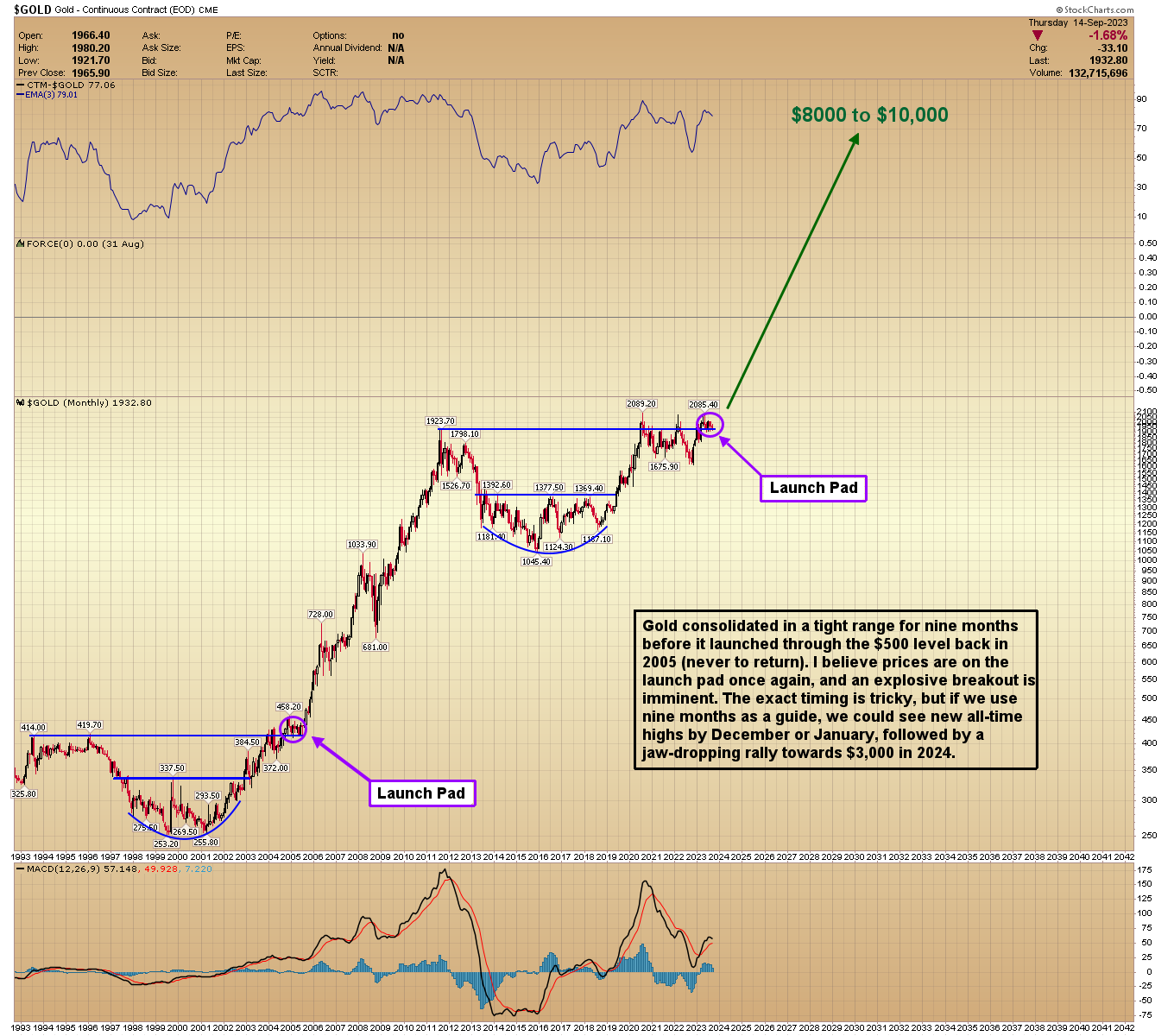




>>> Bank of Israel to sell up to $30 billion of forex to stabilise shekel
Reuters
By Steven Scheer and Ari Rabinovitch
https://www.msn.com/en-us/money/markets/bank-of-israel-to-sell-up-to-30-billion-of-forex-to-stabilise-shekel/ar-AA1hUG9u?OCID=ansmsnnews11
JERUSALEM (Reuters) - The Bank of Israel said on Monday it will sell up to $30 billion of foreign currency in the open market, the central bank's first ever sale of foreign exchange, to maintain stability during the war with Palestinian militants in Gaza.
The shekel fell 2.2% versus the dollar to 3.924 - its lowest since a 2016 - after the announcement, then steadied.
"The bank will operate in the market during the coming period in order to moderate volatility in the shekel exchange rate and to provide the necessary liquidity for the continued proper functioning of the markets," it said in a statement.
The central bank also said it would provide liquidity through SWAP mechanisms in the market of up to $15 billion.
"The Bank of Israel will continue monitoring developments, tracking all the markets, and acting with the tools available to it as necessary," it said.
The shekel was already weak, down 10% against the U.S. currency so far in 2023, partly due to the government's judicial overhaul plan that has sharply curtailed foreign investment.
"Despite our expectation of a weaker Shekel in the medium term - softer tech equity flows, a more complex political background and more two-sided risks to monetary policy - we do not expect further sustained bouts of shekel weakness," Citi economists said in a report.
Israeli stock and bond prices slid 7% on Sunday, a day after Hamas gunmen burst across the fence from Gaza in the deadliest incursion into Israeli territory since Egypt and Syria's attacks in the Yom Kippur war 50 years ago.
On Monday, key Tel Aviv share indices were down as much as another 0.3% in afternoon trading, while government bond prices fell as much as 1%.
Israel's dollar-denominated government bonds also fell sharply in early European trading as investors got their first chance to react to the unprecedented weekend attack.
Most bonds were down between 1.5 and 4 cents although the 2120-maturing '100 year' bond was down over 5 cents at just 65 cents in what was close to being its biggest ever daily drop.
Citi said that in corporate debt, it was likely the primary market activity for Israel’s banks and corporates will be shut in the near-term.
Israel has amassed forex reserves of more than $200 billion, much of it from buying forex since 2008 to try and keep the shekel from strengthening too much and harm exporters as foreign inflows to the country's tech sector soared.
The last time the bank intervened was in January 2022.
Last month, Bank of Israel Governor Amir Yaron told Reuters that despite the sharply weaker shekel that has helped to push up inflation, there was no need to intervene since there were no market failures.
<<<
---
IRAN = OBAMA SENDS $150 BILLION IN CASH TO IRAN BEFORE LEAVING OFFICE IN 2016.
WATCH

https://www.bitchute.com/video/NkHPMc86OIEZ/'
PRESIDENT DONALD J. TRUMP IN WATERLOO, IOWA.
WATCH

https://www.bitchute.com/video/A6JZQa4apVfA/
TRUMP FOR SPEAKER - LET THE GAMES BEGIN
WATCH

https://www.bitchute.com/video/7yfyPMeMcOQ6/
🇦🇷 BREAKING - ISRAEL ATTACKED WITH US FUNDED WEAPONS FROM UKRAINE 👹🇺🇲👹
WATCH

https://www.bitchute.com/video/nSTzGLDEhNWy/
Douglas Macgregor: NATO is Done | Ukrainian Army Defeated.
The Divulge’s Diary
1.52K subscribers

Douglas Macgregor: NATO is Done | Ukrainian Army Defeated.
The Divulge’s Diary
1.52K subscribers
Russian State TV Revives Effort to Reclaim Alaska From U.S.
( Dementia USA should NOT give Putin a reason!)
BY MATTHEW IMPELLI ON 2/10/23 AT 5:20 PM EST
https://www.newsweek.com/russian-state-tv-guest-yevgeny-satanovsky-revives-effort-reclaim-alaska-us-1780536
10.6.23: CALM before STORM! Power moves made. Border, attacks on MAGA, POTUS UP all night, Pray!
And We Know
419K followers

https://rumble.com/v3nfgxj-10.6.23-calm-before-storm-power-moves-made.-border-attacks-on-maga-potus-up.html
BP Oil Spill - Conspiracy Theory with Jesse Ventura Season 2 Ep. 7
Great Awakening World - Truths & Secrets Revealed
85.9K followers

https://rumble.com/v3kt9dp-bp-oil-spill-conspiracy-theory-with-jesse-ventura-season-2-ep.-7.html
WORLDWIDE WATER - CONSPIRACY THEORY WITH JESSE VENTURA SEASON 2 EP. 6
WATCH

https://www.bitchute.com/video/BGbBpboAHDRV/
Biden Administration Enabling Iranian Mullahs' Dangerous Nuclear Weapons Program – Again?
by Majid Rafizadeh
October 7, 2023 at 5:00 am
https://www.gatestoneinstitute.org/20021/biden-enabling-iran-nuclear
Prayers TIA - Reptilian - Conspiracy Theory with Jesse Ventura Season 3 Ep. 1
Great Awakening World - Truths & Secrets Revealed
85.9K followers

https://rumble.com/v3ktgu7-reptilian-conspiracy-theory-with-jesse-ventura-season-3-ep.-1.html
911 Pentagon - Conspiracy Theory with Jesse Ventura Season 2 Ep. 8
Great Awakening World - Truths & Secrets Revealed
85.9K followers

https://rumble.com/v3ktayy-911-pentagon-conspiracy-theory-with-jesse-ventura-season-2-ep.-8.html
Praying for America | You Are Being Targeted as a Domestic Terrorist - 10/5/23
Right Side Broadcasting Network
487K followers

https://rumble.com/v3nh15q-praying-for-america-you-are-being-targeted-as-a-domestic-terrorist-10523.html
BENJAMIN FULFORD - OCTOBER 2023 - UPDATE
WATCH

https://www.bitchute.com/video/hVZzPKBMmGtr/
FEMA FCC 5G KILL GRID -- TODD CALLENDER & DEB TAVARES
WATCH

https://www.bitchute.com/video/2QjUU0c221QC/
BREAKING NEWS: Senate Republicans Demand Immediate Changes To Biden Border Policies
Forbes Breaking News
2.26M subscribers








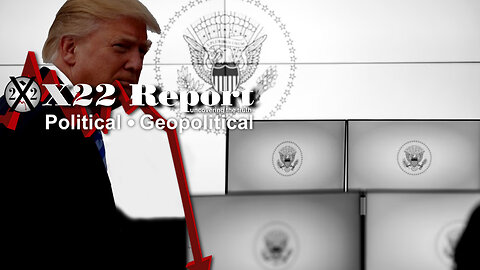

















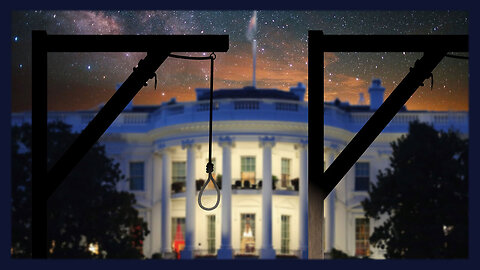


















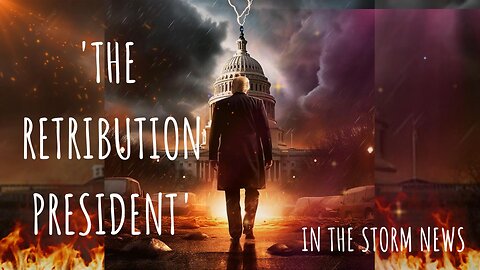













>>> Perion Network Expects 20% YoY Revenue Growth and 40% YoY Increase in Adjusted EBITDA in Second Quarter 2023
Businesswire
July 6, 2023
https://finance.yahoo.com/news/perion-network-expects-20-yoy-070000434.html
Perion Network Expects 20% YoY Revenue Growth And 40% YoY Increase In Adjusted EBITDA In Second Quarter 2023
Company to announce second quarter 2023 financial results and updated annual outlook on August 2, 2023
TEL AVIV & NEW YORK, July 06, 2023--(BUSINESS WIRE)--Perion Network Ltd. (Nasdaq & TASE: PERI), a global advertising technology company whose synergistic solutions are delivered across the three primary channels of digital advertising – search, social media and display/video/CTV advertising, today announced preliminary results for the second quarter of 2023.
$ million
Actual
Q2 2022
Preliminary
Q2 2023
YoY
Revenue
146.7
176.0
20%
Adjusted EBITDA(1)
28.5
40.0
40%
Adjusted EBITDA to Revenue(1)
19%
23%
(1) Adjusted EBITDA is a non-GAAP measure. See a reconciliation table below
"The strength of our second quarter results reflects continued momentum of the business," said Tal Jacobson, Perion’s incoming CEO. "Both the second quarter and first six months highlight the power of our executional agility, underlying technological innovation and market fit. Our diversified and scalable business model has allowed us to capitalize on recent positive market indications, resulting in improved margins and market share gains. Based on preliminary data suggesting stronger than initially anticipated growth, we will provide an update to our annual outlook when we report our financial results on August 2."
Conference Call Details
Perion will release its financial results for the second quarter of 2023 on Wednesday, August 2, 2023, prior to the opening of the financial markets. Incoming CEO Tal Jaconson and CFO Maoz Sigron will host a conference call to discuss the results at 8:30 a.m. ET on the same day.
Registration link:
https://incommconferencing.zoom.us/webinar/register/WN_xMvsgXNoSAyrwYE3yNKUcA#/registration
Toll Free: 1-877-407-0779
Toll/International: 1-201-389-0914
A replay of the call and a transcript will be available within approximately 24 hours of the live event on the investors section of Perion’s website at www.perion.com/investors.
About Perion Network Ltd.
Perion is a global advertising technology company whose synergistic solutions are delivered across the three primary channels of digital advertising – ad search, social media and display / video / CTV advertising. These channels are brought together by Perion’s intelligent Hub, which integrates the company’s business assets from both sides of the open Web, providing significant benefit to its brands and publisher customers.
<<<
---
>>> Ormat Commences Commercial Operation of Two New Battery Storage Facilities for 43MW/43MWh of Cumulative Capacity
Ormat Technologies, Inc.
Jun 26, 2023
https://finance.yahoo.com/news/ormat-commences-commercial-operation-two-131500202.html
Ormat Commenced Commercial Operation of Eight Assets Under Both the Energy Storage and Electricity Segments and Met Its Growth Target for the First Half of 2023
RENO, Nev., June 26, 2023 (GLOBE NEWSWIRE) -- Ormat Technologies, Inc. (NYSE: ORA), a leading renewable energy company, today announced that it has successfully commenced commercial operations for two new battery storage facilities, adding a cumulative capacity of 43MW/43MWh. These storage assets were part of four facilities with a total capacity of 62MW/62MWh planned for the first half of 2023. The completed projects include:
The Upton project, a 23MW/23MWh Battery Energy Storage System (BESS) located in Texas, will provide energy and ancillary services to the Electricity Reliability Council of Texas (ERCOT) and support the electric grid in times of scarcity.
The Andover BESS project, a 20MW/20MWh located in New Jersey, will provide ancillary services to PJM.
The previously announced commercial operation of the 12MW/12MWh Bowling Green and 7MW/7MWh Howell BESS projects, located in Ohio and New Jersey, respectively, that provide ancillary services to PJM.
Doron Blachar, CEO of Ormat Technologies, stated "We are delighted to announce the commencement of operations of two new battery storage facilities. This achievement highlights our commitment to expanding our portfolio of energy storage assets in key U.S. markets. Ormat has successfully executed multiple complex projects overcoming supply chain challenges and met its growth target for the first half of 2023 showcasing our operational capabilities.”
Blachar further highlighted Ormat's recent accomplishments, remarking, “since the beginning of 2023, Ormat has met all Electricity Segment growth targets and successfully completed the construction or enhancement of four power plants, including the 25MW North Valley geothermal power plant, the 6 MW Brady Solar facility, the recovery of Heber 1, and the 6MW upgrade to the Dixie Valley power plant. The successful completion of these projects aligns with the company's goal of expanding its renewable power portfolio and demonstrates a total increase of 99 MW in all segments since the beginning of the year, reaching 1,257 MW.”
Blachar further emphasized the financial benefits of the storage projects, stating, “Ormat will now be able to maximize the economic advantages of these storage assets as they become eligible for Investment Tax Credits (ITC) for the first time. This eligibility allows us to claim approximately 30% of the asset value in tax credits, reducing our capital needs and enhancing earnings. We remain on track with our energy storage growth targets, with plans to bring online two additional assets in 2023 and make further progress towards achieving between 500 to 530 megawatts and over 1 gigawatt-hour in total capacity by the end of 2025. These targets support further top-line and EBITDA expansion."
ABOUT ORMAT TECHNOLOGIES
With over five decades of experience, Ormat Technologies, Inc. is a leading geothermal company and the only vertically integrated company engaged in geothermal and recovered energy generation (“REG”), with robust plans to accelerate long-term growth in the energy storage market and to establish a leading position in the U.S. energy storage market. The Company owns, operates, designs, manufactures, and sells geothermal and REG power plants primarily based on the Ormat Energy Converter – a power generation unit that converts low-, medium- and high-temperature heat into electricity. The Company has engineered, manufactured, and constructed power plants, which it currently owns or has installed for utilities and developers worldwide, totaling approximately 3,200 MW of gross capacity. Ormat leveraged its core capabilities in the geothermal and REG industries and its global presence to expand the Company’s activity into energy storage services, PV solar and energy storage plus PV solar. Ormat’s current total generating portfolio is 1,257MW, comprised of a 1,107 MW geothermal and solar generation portfolio that is spread globally in the U.S., Kenya, Guatemala, Indonesia, Honduras, and Guadeloupe, and a 150 MW energy storage portfolio located in the U.S.
<<<
---
>>> Mobileye Global Inc. (MBLY) engages in the development and deployment of advanced driver assistance systems (ADAS) and autonomous driving technologies and solutions worldwide. The company offers Driver Assist, which comprise ADAS and autonomous vehicle solutions that covers safety features, such as real-time detection of road users, geometry, semantics, and markings to provide safety alerts and emergency interventions; Cloud-Enhanced Driver Assist, a solution for drivers with interpretations of a scene in real-time; Mobileye SuperVision Lite, a navigation and assisted driving solution; and Mobileye SuperVision, an operational point-to-point assisted driving navigation solution on various road types and includes cloud-based enhancements, such as road experience management. It also provides Mobileye Chauffeur, a generation solution; and Mobileye Drive, a self-driving system comprising of radar and lidar subsystems. The company was founded in 1999 and is headquartered in Jerusalem, Israel. Mobileye Global Inc. operates as a subsidiary of Intel Overseas Funding Corporation.
<<<
---
>>> Intel to invest $25 billion in Israel factory in record deal, Netanyahu says
Reuters
6-18-23
https://www.msn.com/en-us/money/topstories/intel-to-invest-25-billion-in-israel-factory-in-record-deal-netanyahu-says/ar-AA1cHten?OCID=ansmsnnews11
JERUSALEM (Reuters) - U.S. chipmaker Intel Corp will spend $25 billion on a new factory in Israel, Prime Minister Benjamin Netanyahu said on Sunday, calling it the largest-ever international investment in the country.
The factory in Kiryat Gat is due to open in 2027, to operate through 2035 at least and to employ thousands of people, Israel's Finance Ministry said. Under the deal Intel will pay a 7.5% tax rate, up from the current 5%, the ministry added.
During its almost five decades of operations in Israel, Intel has grown to become the country's largest privately held employer and exporter and a leader of the local electronics and information industry, according to the company's website.
In 2017, Intel bought Israel-based Mobileye Global Inc, which develops and deploys advanced driver-assistance systems, for $15 billion. Intel took Mobileye public last year.
Announcing the deal in televised remarks to his cabinet, Netanyahu called it "a tremendous achievement for the Israeli economy - 90 billion shekels ($25 billion) - the largest investment ever by an international company in Israel".
In a statement, Intel said its Israel operations had "played a crucial role" in the company's global success.
"Our intention to expand manufacturing capacity in Israel is driven by our commitment to meeting future manufacturing needs ... and we appreciate the continued support of the Israeli government," it said.
<<<
---
>>> Why Perion Network Stock Climbed 17% in March
Motley Fool
By Jeremy Bowman
Apr 10, 2023
https://www.fool.com/investing/2023/04/10/why-perion-network-stock-climbed-17-in-march/?source=eptyholnk0000202&utm_source=yahoo-host&utm_medium=feed&utm_campaign=article
KEY POINTS
The company has emerged as a top performer in the adtech industry.
Its partnership with Microsoft's Bing could unlock more gains.
The stock still looks cheap at a price-to-earnings ratio of 16
.
What happened
Shares of Perion Network (PERI) were gaining in March as the company benefited from the broader recovery in tech stocks and anticipation for the new Bing, which helps Perion because of its strategic partnership with Microsoft.
According to data from S&P Global Market Intelligence, the stock gained 17%. As you can see from the chart below, those gains came primarily in the second half of the month as tech stocks rose broadly in response to falling interest rates.
So what
There was no company-specific news out on Perion, but the stock seems to be picking up momentum after a stellar performance last year and as it gains more recognition thanks to its partnership with Microsoft.
Perion was the only adtech stock on the market to gain last year as the company delivered strong growth on the top and bottom lines and continues to trade at a modest valuation.
In 2022, revenue rose 34% to $640.3 million and adjusted earnings per share jumped 57% to $2.47.
Excitement around the stock also seems to be building as the new Bing, which is powered by ChatGPT, attracted more attention. Perion is a preferred partner of Bing, repackaging ads and adding premium features to them in order to boost clicks and conversions. The current contract between the two companies runs through the end of 2024, but Perion has won accolades from Microsoft, indicating a high likelihood that the partnership will be renewed.
Last year, more than 40% of Perion's revenue came from search, nearly all of that from Bing, and Microsoft's CFO has said that every percentage point of market share that Bing gains would translate into nearly $2 billion of additional revenue for Microsoft, a potential windfall for Perion.
Additionally, the stock got a bullish analyst note as Needham raised its price target from $37 to $42, noting that its productivity trends were tops in the adtech industry in each quarter in 2022 and it expected that trend to continue in 2023. Needham also noted improving revenue per employee, a sign that the company's gaining leverage on the bottom line.
Now what
Even after last month's gains, the stock still looks cheap at a price-to-earnings ratio of 16.
Perion will report first-quarter earnings on May 3. Analysts are expecting revenue to increase 13% to $141.3 million, and for adjusted earnings per share to rise from $0.33 to $0.41. Keep an eye on the earnings report as strong numbers could spark another leg up for the stock.
<<<
---
Perion Network (PERI) - >>> Global advertising technology company Perion Network is another stock investors may want to consider buying for growth. Perion’s synergistic solutions are delivered across the three primary channels of digital advertising; ad search, social media, and display which includes video and CTV advertising.
https://finance.yahoo.com/news/2-tech-stocks-buy-stellar-233411839.html
Perion has grown immensely throughout the pandemic and its earnings estimate revisions are standing out at the moment. This is a good sign that advertisers and businesses are looking to spend more on branding and publishing as they adjust to high inflation.
To that point, Perion easily surpassed its Q4 bottom-line expectations in early February and also beat top-line estimates. In correlation, Perion’s fiscal 2023 and FY24 EPS estimates have gone up 16% and 13% respectively.
Fiscal 2023 earnings are now projected to be up 9% this year and rise another 8% in FY24 at $2.92 per share. Sales are forecasted to jump 14% in FY23 and climb another 12% in FY24 to $821.48 million. Plus, fiscal 2024 would represent 214% growth from pre-pandemic levels with 2019 sales at $261 million.
Perion stock is up +42% year to date to largely outperform the broader indexes and the Internet Content Market with its continued growth indicating there could be more upside. Furthermore, over the last three years, Perion stock is up +478% to crush the benchmark, Nasdaq, and its Zacks Subindustry’s +43%.
<<<
---
SolarEdge Technologies - >>> SolarEdge Technologies develops and manufactures an optimized inverter system. The component maximizes the power produced by solar panels, helping to lower the cost of energy generated by the system. Like First Solar, SolarEdge Technologies should benefit from the accelerating growth of solar energy worldwide.
https://www.fool.com/investing/stock-market/market-sectors/energy/renewable-energy-stocks/
The company has also started to leverage its expertise in inverters to create other smart energy solutions. It has expanded its offerings by making a series of acquisitions to gain technology, expertise, and products that address several energy market segments, including solar, storage, electric vehicle charging, batteries, uninterruptible power supplies (UPS), electric vehicle powertrains, and grid services solutions.
SolarEdge Technologies has been able to expand further into smart energy solutions, thanks in part to its strong financial profile. The company’s core inverter business is profitable and generates lots of cash. It had almost $1 billion of net cash in 2022, giving it the flexibility to continue expanding to further capitalize on the decarbonization megatrend.
<<<
---
Perion - >>> This Ad Tech Stock Could Win Big From Microsoft's ChatGPT Investment
Motley Fool
By Jeremy Bowman
Feb 16, 2023
https://www.fool.com/investing/2023/02/16/this-ad-tech-could-win-big-from-microsofts-chatgpt/?source=eptyholnk0000202&utm_source=yahoo-host&utm_medium=feed&utm_campaign=article
KEY POINTS
Perion's technology helps search engine advertisers better monetize their ads.
The adtech company beat estimates on the top and bottom lines in its latest earnings report.
Its relationship with Microsoft and its ChatGPT-powered Bing stands to offer huge potential.
Perion Network (PERI) has been a surprising winner in the ad tech industry in recent years. In fact, according to the company, it was the only one of 52 ad tech stocks to post a gain in 2022.
The Israel-based, small-cap company has gained market share thanks to innovative premium advertising products and its intelligent hub, which efficiently connects ad buyers and sellers.
That strength was on display in the company's recent earnings report. Fourth-quarter revenue rose 33% to $209.7 million, driving adjusted earnings per share up 45% to $0.90. Both numbers easily beat analyst estimates.
Revenue growth was led by its search segment, where sales rose 49% to $85.9 million. Management said demand for direct-response for advertising was strong since advertisers tend to shift resources to search in difficult macroeconomic environments like the current one.
In spite of the strong results, the stock actually fell on the news, declining 8% on Feb. 8, though it has since recouped most of that loss. The decline could be because the company offered conservative guidance for 2023, forecasting revenue growth to slow to 14%, or because CEO Doron Gerstel is stepping down after a successful run, to be replaced by Tal Jacobson, who currently runs the company's search advertising business, CodeFuel.
The growth in Perion's search business is primarily driven by Microsoft's Bing, with which Perion is a preferred partner. With the recent announcement of Microsoft's new ChatGPT-powered Bing, Perion could be a big winner.
What the new Bing could mean
On the recent earnings call, Gerstel discussed the implication of ChatGPT, saying: "With regard to search, our expectation is that ChatGPT will revolutionize Bing search capabilities by providing more advanced and intuitive search experiences for its users, better meeting their needs and expectations. We believe that such superior search results will increase advertiser spending, and as a result, we expect to see a very positive impact on our search business."
The ChatGPT-powered Bing hasn't been made available to the general public yet, but at the very least, it will likely drive more attention to Microsoft's search engine as chat represents the new frontier in search.
Perion's technology helps Bing advertisers better monetize their ads on the platform, and Perion earns revenue share from ad clicks on the search engine. Because of that direct relationship, Perion will benefit as Bing earns more search traffic.
In Microsoft's own presentation on the new Bing last week, Chief Financial Officer Amy Hood said that for each additional percentage point of market share Bing earns, it gets $2 billion more in revenue. For Perion, that could translate into tens of millions or even hundreds of millions of dollars more in search revenue, since Gerstel explained on the call that he's expecting Bing to attract more and higher bids from advertisers as it rolls out enhanced search capabilities.
Its relationship with Microsoft also seems strong as Perion was named Microsoft's Advertising Global Supply Partner of the Year. Its current contract runs through the end of 2024.
What's next for Perion
With Gerstel set to step down later in the year, 2023 will be transitional for the company, and despite its conservative guidance, it still seems well-positioned to deliver solid growth this year.
In addition to the momentum from ChatGPT, the company is gaining traction from its cookie-less technology SORT, which drives a click-through rate of 1.33%, nearly triple that of the Google benchmark at 0.46%. It also continues to see momentum in connected TV as CTV revenue jumped 108%, helped by the company's innovative picture-in-picture advertising during live events like sports
There's also the potential for the company to drive growth in the business through more mergers and acquisitions. On the earning call, management said that its 2021 acquisition of Vidazoo, a video-monetization platform, has driven significant growth -- and at great value, since Perion acquired it for just 6.5 times Vidazoo's earnings before interest, taxes, depreciaion, and amortization (EBITDA).
Investors might have been surprised to see Gerstel stepping down, but given Jacobson's background in search advertising, he seems like a good fit for the current moment.
With momentum in a number of growth areas and the coming release of the new Bing, Perion seems well-positioned to continue growing. And the stock trades at a price-to-earnings ratio under 16, which seems dirt cheap considering its track record and growth prospects.
Perion doesn't need the new Bing to succeed, but if it does, this overlooked ad tech stock could really take off.
<<<
---
InMode - >>> Better Medtech Stock to Buy: InMode or Outset Medical?
Motley Fool
By Keith Speights
Feb 15, 2023
https://www.fool.com/investing/2023/02/15/better-medtech-stock-to-buy-inmode-or-outset-medic/?source=eptyholnk0000202&utm_source=yahoo-host&utm_medium=feed&utm_campaign=article
KEY POINTS
Both InMode and Outset Medical have solid growth prospects.
The main knock against Outset is that it isn't profitable yet, while InMode already generates strong profits.
The better medtech stock to buy could depend on your investing time horizon.
Sometimes the best opportunities are found in the laggards. Take medical technology (or medtech) stocks, for example. As a group, medtech stocks haven't performed well over the last year. However, their long-term potential should be great.
Two underperforming medtech stocks especially stand out. Both InMode (INMD 0.78%) and Outset Medical (OM -1.71%) reported their fourth-quarter results this week.
Which is the better medtech stock to buy? Here's how InMode and Outset stack up against each other.
Growth prospects
InMode is an Israel-based company that makes radio-frequency (RF) energy technology used for face and body contouring, medical aesthetics, and women's health. Outset Medical is a California-based company that makes hemodialysis systems. The growth prospects for both companies appear to be strong.
On Tuesday, InMode reported record revenue of $133.6 million in the fourth quarter of 2022, up 21% year over year. It also achieved record adjusted earnings of $66.4 million. The company projects full-year 2023 revenue of between $525 million and $530 million. The midpoint of this range reflects 16% growth.
Wall Street thinks that InMode will be able to deliver average annual earnings growth of 33% over the next five years. Unsurprisingly, analysts are bullish about the stock, with the average 12-month price target reflecting an upside potential of nearly 40%.
Outset Medical announced its Q4 results after the market closed on Monday. The company's revenue jumped 15% year over year to $32 million. However, Outset remains unprofitable, posting a Q4 net loss of $41.4 million.
The company expects to increase its revenue by 22% to 30% in 2023. Over the longer term, Outset hopes to capture a big chunk of the U.S. total addressable market of $11.4 billion. The majority of this market is in home dialysis. Outset thinks that its Tablo system offers significant competitive advantages for home use.
Financial positions
InMode had a cash stockpile (including cash, cash equivalents, marketable securities, and short-term bank deposits) of $547.4 million at the end of 2022. The company should continue to be profitable. Therefore, it won't need to tap its cash to fund ongoing operations.
Outset Medical's cash position totaled $290.8 million as of Dec. 31, 2022. The company isn't likely to turn a profit in the near future, though. This means that Outset will use some of its cash to fund operations.
The good news is that management expects to burn less cash in 2023 than in 2022. Outset also has around $200 million that it can draw down with its term loan facilities.
Valuation
InMode's shares currently trade at 13.2 times expected earnings and nearly 6.9 times trailing-12-month sales. The stock's price-to-earnings-to-growth (PEG) ratio is 2.9. This level indicates a relatively high valuation based on growth projections.
Because Outset Medical isn't profitable yet, earnings-based valuation metrics aren't applicable. However, the stock trades at nearly 12 times sales.
Better medtech stock?
So which of these two medtech stocks is the better pick right now? I think that InMode is more likely to beat the market in 2023 than Outset Medical is.
Analysts absolutely love the stock. Investors cheered InMode's Q4 update. Barring a severe recession, the stock should deliver solid returns this year.
Over the longer term, though, I suspect that Outset Medical will be the bigger winner. The company is currently only scratching the surface of its opportunity in the home dialysis market.
In my view, investors don't have to go with only "in" or "out." Both InMode and Outset are great picks.
<<<
---
>>> Camtek Ltd. (CAMT), together with its subsidiaries, develops, manufactures, and sells inspection and metrology equipment for the advanced interconnect packaging, memory, complementary metal oxide semiconductor image sensors, micro-electro mechanical systems, radio frequency, and other segments of the semiconductor industry. It provides inspection and metrology systems, including Eagle-i, a system that delivers 2D inspection and metrology capabilities; Eagle-AP, which addresses the advanced packaging market using software and hardware technologies that deliver superior 2D and 3D inspection and metrology capabilities on the same platform; and Golden Eagle, a panel inspection and metrology system to support fanout wafer level packaging applications. The company sells its products in the Asia Pacific, the United States, and Europe. Camtek Ltd. was incorporated in 1987 and is headquartered in Migdal HaEmek, Israel.
<<<
---
>>> Perion Network - If you're looking for promising growth stocks, a great place to start your search is in the ad tech industry. For the most part, ad tech stocks are not only growing fast but are also profitable, and Perion Network (PERI 2.03%) offers a great example.
The company operates primarily through its intelligent hub, a digital advertising marketplace that connects buyers and sellers, optimizing ad purchases and placements and adding value for both sides. The company also offers premium experiences through connected TV and other channels, such as a "connected cart" that allows viewers to buy an advertised product with a QR code.
Like other ad tech stocks, Perion delivered strong growth early in the pandemic, but the company also continued to grow over the last year even as growth in the digital advertising industry has slowed, a sign Perion delivers a high return on investment for advertisers.
Revenue in 2023 rose 33% to $636 million, and adjusted earnings before interest, taxes, depreciation, and amortization (EBITDA) jumped 88% to $131 million. At a market cap of just $1.44 billion, that means the stock trades at just 11 times EBITDA, a surprisingly low valuation for a stock that just doubled its EBITDA profits.
With a combination of growth, a low valuation, and a small-cap valuation, Perion has the potential to be a multibagging stock over the coming years.
<<<
https://www.fool.com/investing/2023/01/27/want-1-million-in-retirement-invest-50000-in-these/?source=eptyholnk0000202&utm_source=yahoo-host&utm_medium=feed&utm_campaign=article
---
>>> MIND C.T.I. Ltd. (MNDO), together with its subsidiaries, designs, develops, markets, supports, implements, and operates billing and customer care systems in the Americas, Europe, Israel, the Asia Pacific, and Africa. It operates in two segments, Billing and Related Services and Messaging. The company offers billing and customer care solutions that support various services, such as voice, data, and content services, as well as prepaid, postpaid, and pay-in-advance payment models in a single platform. Its solutions also include a workflow engine to support the implementation of business processes, including subscriber registration, order management, trouble ticket, and debt collection; and an integral point of sale solution that covers all dealer, store and cashier management, and sales cycle related activities. In addition, the company offers professional services comprising turnkey project delivery, customer support and maintenance, integration, customizations, and project management, as well as managed services, including day to day billing operational tasks to its billing and customer care customers. Further, it provides PhonEX ONE, a call management system that collects, records, and stores call information, which is used by organizations for telecom expense management, call accounting, traffic analysis, and fraud detection. The company offers its products directly, as well as through distributors and resellers primarily to communication service providers, such as traditional wireline and wireless, voice over IP, broadband IP network operators, wireless internet service providers, LTE operators, cable operators, and mobile virtual network operators. MIND C.T.I. Ltd. was incorporated in 1995 and is headquartered in Yokne'am Illit, Israel.
<<<
---
>>> AudioCodes Ltd. (AUDC) provides advanced communications software, products, and productivity solutions for the digital workplace. The company offers solutions, products, and services for unified communications, contact centers, VoiceAI business line, and service provider business. Its products include session border controllers, life cycle management solutions, VoIP network routing solutions, media gateways and servers, multi-service business routers, IP phones solutions, and value-added applications, as well as professional services. The company also offers One Voice Operations Center, a voice network management solution; Device Manager for administering business phones and meeting room solutions; AudioCodes Routing Manager for handling call routing in VoIP networks; and User Management Pack 365 simplifies user lifecycle and identity management across Microsoft Teams and Skype for Business deployments. In addition, it provides AudioCodes Live for Microsoft Teams, a portfolio of managed services for simplifying Teams adoption; appliances for Microsoft Skype/Teams for Business such as survivable branch appliances, CCE, and CloudBond 365; and a range of value-added voice applications comprising SmartTAP, Voca, VoiceAI Connect, and Meeting Insights. Further, the company offers managed services; and AudioCodes Live Cloud, a Microsoft Teams software as a service solution that enables service providers to offer their business customers a seamless migration to Microsoft Teams. It primarily markets and sells its products through a direct sales force and sales representatives to original equipment manufacturers, network equipment providers, and systems integrators and distributors in the telecommunications and networking industries. The company primarily operates in the Americas, Europe, the Far East, and Israel. AudioCodes Ltd. was incorporated in 1992 and is headquartered in Lod, Israel.
<<<
---
>>> G. Willi-Food International Ltd. (WILC) develops, imports, exports, markets, and distributes food products worldwide. It offers mushrooms, artichoke, beans, asparagus, capers, corn kernels, baby corn, palm hearts, vine leaves, sour pickles, mixed pickled vegetables, pickled peppers, olives, garlic, roasted eggplant sun, and dried tomatoes; and canned fish comprising tuna, sardine, anchovies, smoked and pressed cod liver, herring, fish paste, and salmon products. The company also provides pineapples, peaches, apricots, pears, mangos, cherries, litchis, and fruit cocktail; olive, sunflower, soybean, corn, and rapeseed oils; dairy and dairy substitutes consisting of cheese, feta, Bulgarian cubes, goat cheese, fetina, butter, butter spread, margarine, melted cheese, cheese alternative, condensed milk, whipped cream, yogurt, frozen pizza, and other products; and dried fruits, nuts, and beans, such as figs, apricots, organic chestnuts, sunflower seeds, walnuts, pine nuts, cashews, banana chips, pistachios, and peanuts. In addition, it offers instant noodle soup, frozen edamame soybean, freeze dried instant coffee, bagel, breadstick, coffee creamer, lemon juice, halva, Turkish delight, cookies, vinegar, sweet pastry and crackers, sauce, corn flour, rice, rice sticks, pasta, organic pasta, spaghetti and noodles, breakfast cereals, corn flakes, rusks, tortilla, dried apples snacks, desert, ice cream, and light and alcoholic beverages. It markets its products under the Willi-Food, Donna Rozza, Manchow, Gold Frost, Tifeeret, the Chef Dish, Art Coffe, Mr Chang, Muchi, Euro Butter, Euro Spread, Euro Cheese, Euro Cream, Euro Dessert, Euro Veg, Ha-Bulgaria, Gelato, Pinukim, Emma, and TenBo brand names. The company was formerly known as G. Willi-Food Ltd. and changed its name to G. Willi-Food International Ltd. in June 1996. The company was incorporated in 1994 and is headquartered in Yavne, Israel. G. Willi-Food International Ltd. is a subsidiary of Willi-Food Investments Ltd.
<<<
---
>>> Otonomo Technologies Ltd. (OTMO) provides an automotive data service platform and marketplace that enables car manufacturers, drivers, and service providers to be part of a connected ecosystem. The company offers cabin data, including the state of doors and windows, ADAS, and infotainment data; engine-related information, such as fuel, oil, error codes or battery voltage, and state of charge; maintenance data comprising time or distance traveled and diagnostic trouble codes; data related to the specific vehicles, which include making, model, year, and fuel type; driving data consisting of location, distance travelled, odometer, and heading and speed; and environmental data that include external weather and temperature, and road hazards and road signs. Its data is used for various services, such as preventative maintenance, EV management, emergency services, on-demand fueling, insurance, and smart cities. The company collects vehicle-specific and aggregated data from vehicle data providers, such as vehicle manufacturers, vehicle fleet operators, and telematics service providers, as well as licenses software. It serves in North America, the Asia Pacific, Europe, the Middle East, and Africa. Otonomo Technologies Ltd. was founded in 2015 and is headquartered in Herzliya, Israel.
<<<
---
>>> Perion Network Ltd. (PERI) provides digital advertising solutions to brands, agencies, and publishers in North America, Europe, and internationally. It provides Wildfire, a content monetization platform; search monetization solutions, including website monetization, search mediation, and app monetization; and cross-channel digital advertising software as a service platform. The company also offers supply management platform; demand management platform for campaign planning and design; analytics platform, which provides information and performance insights on the results of campaign investment and other campaign metrics; creative platform to create advertisements; and an AI platform that uses machine learning to bring intelligence to the various phases of campaigns. In addition, it provides an actionable performance monitoring platform to support the various phases of campaign management; an online video player and integrated ad server to upload, manage, and stream video content; content monetization system, which integrates ads within the content layouts at the page level. Further, the company offers a publisher management system that provides analytics and performance optimization tools, as well as reports; search-demand management systems; monetization products that integrate and onboards demand vendors; and AI Systems. Additionally, it provides Intelligent HUB (iHUB), a platform for pulling in signals across various advertising channels and optimizing traffic at scale, and yielding engagement metrics and KPIs; and strategic optimization of relevant traits (SORT), a provisional patent technology that eliminates the need for cookies. The company was formerly known as IncrediMail Ltd. and changed its name to Perion Network Ltd. in November 2011. Perion Network Ltd. was incorporated in 1999 and is headquartered in Holon, Israel.
<<<
---
>>> InMode Ltd. (INMD) designs, develops, manufactures, and markets minimally invasive aesthetic medical products based on its proprietary radiofrequency assisted lipolysis and deep subdermal fractional radiofrequency technologies in the United States and internationally. The company offers minimally invasive aesthetic medical products for various procedures, such as liposuction with simultaneous skin tightening, body and face contouring, and ablative skin rejuvenation treatments, as well as for use in women's health conditions and procedures. It also designs, develops, manufactures, and markets non-invasive medical aesthetic products that target an array of procedures, including permanent hair reduction, facial skin rejuvenation, wrinkle reduction, cellulite treatment, skin appearance and texture, and superficial benign vascular and pigmented lesions, as well as hands-free medical aesthetic products that target a range of procedures, such as skin tightening, fat reduction, and muscle stimulation. The company was formerly known as Invasix Ltd. and changed its name to InMode Ltd. in November 2017. InMode Ltd. was incorporated in 2008 and is headquartered in Yokneam, Israel.
<<<
---
>>> ICL Group Ltd (NYSE:ICL)
https://www.yahoo.com/now/11-best-farmland-agriculture-stocks-211441951.html
Number of Hedge Fund Holders: 17
ICL Group Ltd (NYSE:ICL) is headquartered in Tel Aviv, Israel, and it operates as a specialty minerals and chemicals company worldwide. The company has four segments – Industrial Products, Potash, Phosphate Solutions, and Innovative Ag Solutions. It is one of the best agriculture stocks to invest in. In Q3 2022, ICL Group Ltd (NYSE:ICL) reported adjusted EBITDA of $1,049 million, up 139% versus $438 million in the last quarter. Adjusted EBITDA margin came in at 41.6%, up from 24.5% in the prior quarter.
On November 17, Barclays analyst Benjamin Theurer maintained an Equal Weight rating on ICL Group Ltd (NYSE:ICL) and lowered the price target on the shares to $11 from $12 after the earnings season. While the analyst remains positive about the broader agriculture space, he believes fiscal 2023 will in part be a year of relatively more normal earnings levels, with results beating performance prior to sanctions against Belarus being introduced and Russia's invasion of Ukraine.
According to Insider Monkey’s Q3 data, 17 hedge funds were bullish on ICL Group Ltd (NYSE:ICL), compared to 13 funds in the prior quarter.
<<<
>>> ICL Group Ltd (ICL), together with its subsidiaries, operates as a specialty minerals and chemicals company worldwide. It operates in four segments: Industrial Products, Potash, Phosphate Solutions, and Innovative Ag Solutions (IAS). The Industrial Products segment produces bromine out of a solution that is a by-product of the potash production process, as well as bromine-based compounds; produces various grades of potash, salt, magnesium chloride, and magnesia products; and produces and markets phosphorous-based flame retardants and other phosphorus-based products. The Potash segment extracts potash from the Dead Sea; mines and produces potash and salt; produces Polysulphate; produces, markets, and sells magnesium and magnesium alloys, as well as related by-products, including chlorine and sylvinite; and sells salt. The Phosphate Solutions segment uses phosphate commodity products to produce specialty products; produces and markets phosphate-based fertilizers, as well as sulphuric acid, green phosphoric acid, and phosphate fertilizers; and manufactures thermal phosphoric acid for various industrial end markets, such as oral care, cleaning products, paints and coatings, water treatment, asphalt modification, construction, and metal treatment. It also develops and produces functional food ingredients and phosphate additives for use in the processed meat, poultry, seafood, dairy, beverage, and baked goods markets; and produces milk and whey proteins for the food ingredients industry. The IAS segment develops, manufactures, markets, and sells fertilizers based primarily on nitrogen, potash, and phosphate, including water soluble specialty, liquid, soluble, and controlled-release fertilizers. It sells its products through marketing companies, agents, and distributors. The company was formerly known as Israel Chemicals Ltd. and changed its name to ICL Group Ltd in May 2020. The company was founded in 1968 and is headquartered in Tel Aviv, Israel.
<<<
---
>>> Israel refills the Sea of Galilee, supplying Jordan on the way
Reuters
January 30, 2023
https://www.yahoo.com/news/israel-refills-sea-galilee-supplying-215147564.html
STORY: Israel is saving its main freshwater reservoir from the effects of climate change
The Sea of Galilee was being lost to droughts
So Israel built a chain of desalination plants along its Mediterranean coast
They turn seawater into freshwater, to refill the lake when water levels get low
"With this environment of climate changes, you don't know what to expect next year and the year afterward. We are standing now in the late January and with very little rainfalls during this winter in Israel, arid winter basically with no rainfall. And we are no longer depending on rain basically for water supply because we know to manage the system and take the extra water, the extra water we produce artificially with desalination plants, and bring it to fill the natural lake if needed."
The new system will also allow Israel to double the amount of water it sells to Jordan
Water was a major component in the1994 peace treaty between the two nations
<<<
---
Steakholder Foods (STKH) -
>>> MeaTech 3D Ltd., a deep-tech food company, engages in the development of cultivated meat technologies to manufacture cultivated meat without animal slaughter. The company develops a three-dimensional bioprinter to deposit layers of differentiated stem cells, scaffolding, and cell nutrients in a three-dimensional form of structured cultured meat. It intends to license its production technology; provide associated products, such as cell lines, printheads, bioreactors, and incubators; and offer services, such as technology implementation, training, and engineering support directly and through contractors to food processing and food retail companies. The company is headquartered in Rehovot, Israel.
<<<
---
>>> Nano Dimension to Highlight Its Diversified Portfolio and Innovation at Formnext
Nano Dimension Ltd.
November 7, 2022
https://finance.yahoo.com/news/nano-dimension-highlight-diversified-portfolio-140000906.html
Nano Dimension Ltd.
Participants Will See the Company’s Comprehensive Solutions Across Additive Electronics & Additive Manufacturing
Waltham, Mass., Nov. 07, 2022 (GLOBE NEWSWIRE) -- Nano Dimension Ltd. (Nasdaq: NNDM, “Nano Dimension” or the “Company”), a leading supplier of Additively Manufactured Electronics (“AME”) and multi-dimensional polymer, metal & ceramic Additive Manufacturing (“AM”) 3D printers, will showcase how its products and technologies are reinventing manufacturing at the upcoming Formnext 2022 event in Frankfurt, Germany, November 15-18 (Stand C119).
Nano Dimension’s vision to transform additive electronics and additive manufacturing will be on full display. Conference participants including industry leaders, customers, and capital market stakeholders will have a chance to see much of what has come to represent Nano Dimension after a robust R&D program and a series of strategic acquisitions.
Formnext participants will see the DragonFly® IV AME system, the leader in AME to produce electronic components; the Fabrica 2.0, a pioneer in micro-AM to fabricate millimeter size parts at micron resolution; the Admaflex 300, an innovator in DLP for ceramic and metal industrial parts; and the Atlas® Software Suite that controls market leading printing systems used worldwide in additive manufacturing applications.
“We are excited that we will be able to feature so much in one place. The thousands of people at Formnext will appreciate what so many customers have, and that is the unique combination of our solutions across additive electronics and additive manufacturing,” said Nano Dimension President Zivi Nedivi. “We look forward to partnering with industry leaders and educational institutions who are ready to take this journey.”
Nano Dimension encourages Formnext attendees to stop by Stand C119 and see the technology in action and discuss how it can be integrated to add flexibility and agility into their business’ production process.
About Nano Dimension
Nano Dimension’s (Nasdaq: NNDM) vision is to transform the electronics and similar additive manufacturing sectors through the development and delivery of an environmentally friendly and economically efficient additive manufacturing, Industry 4.0 solution, while enabling a one-production-step-conversion of digital designs into functioning devices – on-demand, anytime, anywhere.
The DragonFly® IV system and specialized materials serve cross-industry High-Performance-Electronic-Devices (Hi-PED®s) fabrication needs by simultaneously depositing proprietary conductive and dielectric substances while integrating in-situ capacitors, antennas, coils, transformers, and electromechanical components. The outcomes are Hi-PEDs which are critical enablers of autonomous intelligent drones, cars, satellites, smartphones, and in vivo medical devices. In addition, these products enable iterative development, IP safety, fast time-to-market, and device performance gains.
Nano Dimension also develops complementary production equipment for Hi-PEDs and printed circuit board (PCB) assembly (Puma, Fox, Tarantula, Spider, etc.). The core competitive edge for this technology is in its adaptive, highly flexible surface-mount technology (SMT) pick-and-place equipment, materials dispenser suitable for both high-speed dispensing and micro-dispensing, as well as an intelligent production material storage and logistics system.
Additionally, Nano Dimension is a leading developer and supplier of high-performance control electronics, software, and ink delivery system. It invents and delivers state-of-the-art 2D and 3D printing hardware and unique operating software. It focuses on high-value, precision-oriented applications such as specialized direct-to-container packaging, printed electronics functional fluids, and 3D printing, which is all controlled by the proprietary software system - Atlas.
Serving similar users of Hi-PEDs, Nano Dimension’s Fabrica 2.0 micro additive manufacturing system enables the production of microparts based on a Digital Light Processor (DLP) engine that achieves repeatable micron levels resolution. The Fabrica 2.0 is engineered with a patented array of sensors that allows a closed feedback loop, using proprietary materials to achieve very high accuracy while remaining a cost-effective mass manufacturing solution. It is used in the areas of micron-level resolution of medical devices, micro-optics, semiconductors, micro-electronics, micro-electro-mechanical systems (MEMS), microfluidics, and life sciences instruments.
<<<
---
>>> NICE Shares Pop After Q3 Beat; Clocks 12% Revenue Growth Backed By Cloud Momentum
Benzinga
by Anusuya Lahiri
November 10, 2022
https://finance.yahoo.com/news/nice-shares-pop-q3-beat-132722257.html
NICE Ltd (NASDAQ: NICE) reported third-quarter FY22 non-GAAP revenue growth of 12.2% year on year to $554.7 million, beating the consensus of $548.8 million.
Non-GAAP revenues from Cloud grew 26% Y/Y to $330.5 million.
The non-GAAP gross margin expanded 120 bps to 73.5%, while the non-GAAP operating margin expanded 40 bps to 28.7%.
Non-GAAP EPS of $1.92 beat the consensus of $1.87.
NICE generated $94.3 million in operating cash flow and held $1.46 billion in cash and equivalents.
CEO Barak Eilam said, "We reported double-digit growth in total revenue driven by another excellent quarter in cloud revenue, which grew 27% at constant currency."
Eilam continued, "We are witnessing a dramatic shift in the enterprise software landscape that is creating massive opportunities for some and unbridgeable gaps for others."
Outlook: NICE reiterated the FY22 non-GAAP revenue outlook of $2.168 billion - $2.188 billion (consensus: $2.18 billion).
NICE boosted non-GAAP EPS from $7.33 - $7.53 to $7.40 - $7.60 (consensus: $7.45).
Price Action: NICE shares traded higher by 9.69% at $184.02 in the premarket session on the last check Thursday.
<<<
---
MAGA WATCH LIVE: PRESIDENT DONALD J. TRUMP HOLDS SAVE AMERICA RALLY IN ROBSTOWN, TX 10/22/22
by RSBN
https://www.rsbnetwork.com/video/watch-live-president-donald-j-trump-holds-save-america-rally-in-robstown-tx-10-22-22/
Saturday, October 22, 2022: Join the RSBN broadcast team LIVE from Robstown, TX for all day coverage of President Donald J. Trump’s Save America rally.
President Donald J. Trump, 45th President of the United States of America, will hold a rally in Robstown, Texas on Saturday, October 22, 2022, at 7:00PM CDT.
Saturday, October 22, 2022, at 7:00PM CDT
President Donald J. Trump, 45th President of the United States of America, delivers remarks in support of his unprecedented effort to advance the MAGA agenda by energizing voters and highlighting the slate of 33-0 Trump Endorsed America First candidates in the Great State of Texas.
Additional Special Guest Speakers will be Announced.
Venue:
Richard M. Borchard Regional Fairgrounds
1213 Terry Shamsie Blvd.
Robstown, TX 78380
Timeline of Events:
8:00AM – Parking Lots, Vendor Row, and Registration Open
2:00PM – Doors Open
4:00PM – Special Guest Speakers Deliver Remarks
7:00PM – 45th President of the United States Donald J. Trump Delivers Remarks
Entertainment and Concessions will be available throughout the day!
JULIE GREEN PROPHETIC WORD [REVERSALS ARE COMING] CHANGE IS COMING - TRUMP NEWS
Trump News Channel Published October 15, 2022
The Lords Day

https://rumble.com/v1p43dv-the-lords-day.html

https://rumble.com/v1o4gov-julie-green-prophetc-word-reversals-are-coming-change-is-coming-trump-news.html
OVERDUE FROM THE HAGUE. INTERNATIONAL TRIALS DAY ONE - NWO CRIMES AGAINST HUMANITY
WATCH

https://www.bitchute.com/video/GjEgSnACO93V/
Gold Standard Bargain; Aris Mining Corp.
https://www.aris-mining.com/operations/operating-mines/segovia/overview/default.aspx
https://www.aris-mining.com/investors/events-and-presentations/default.aspx
https://www.aris-mining.com/
Ted Butler: Stand up against market manipulation and make a difference
By Ted Butler
SilverSeek.com
Friday, October 14, 2022
If you are tired of witnessing silver (and gold) continuing to be manipulated in price, here's a no-cost, no-risk, high-potential return action you can take that will only involve a few minutes of your time. Quite literally, there's absolutely nothing to lose and quite a lot of potential good to be had.
The Commodity Futures Trading Commission is the taxpayer-funded federal commodities regulator whose main mission is to prevent and root out manipulation and protect the public. Four of the five commissioners have been in office for little more than six months and it's not clear that they are even aware that silver has been manipulated in price on the Comex.
Here is your opportunity to ensure that this is an issue they should be concerned about. Please take the time to copy and paste the letter below and email it to addresses listed. If you would prefer using your own name and not mine, you have my permission to do so. ...
... For the remainder of the commentary:
https://silverseek.com/article/stand-and-make-difference
https://www.aris-mining.com/operations/operating-mines/segovia/overview/default.aspx
https://www.aris-mining.com/investors/events-and-presentations/default.aspx
https://www.aris-mining.com/
GOD'S Money Bargain "Gold Standard Restoration Act" Would Peg Dollar To Gold At Fixed Price
28,398 views Oct 11, 2022
The Mother Of All Debt Bubbles Is About To






















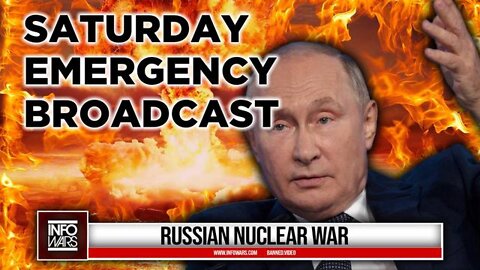


.jpg)










.jpg)
.jpg)

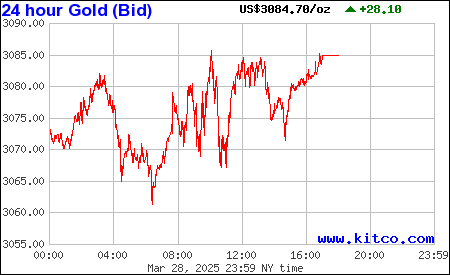



President Trump calls for return to paper ballots, end of no-excuses mail-in voting
"You would have elections that everybody could be proud of. Because right now
this country is a laughingstock all over the world," former president said in an
interview with Just the News
https://justthenews.com/politics-policy/all-things-trump/trump-calls-return-paper-ballots-end-no-excuses-mail-voting
PRESIDENT TRUMP COULD BE REINSTATED IMMEDIATELY BY THIS SUPREME COURT DECISION!
WATCH
https://www.bitchute.com/video/WsBfrXELPByE/
UK RIGHT NOW.....
WATCH

https://www.bitchute.com/video/6WxNNDpkTIGq/
President Donald Trump's Full Speech at the Hispanic Leadership Conference
Real America's Voice - Special Events Published October 5, 2022

https://rumble.com/v1msnoq-president-donald-trumps-full-speech-at-the-hispanic-leadership-conference.html
Everything has been stolen from us who follow the Law out country has been destroyed the Voter Fraud is massive
Large Garbage Bag Used To Transfer Stacks of Absentee Ballots From Detroit Drop Box…Is This What SOS Benson Means When She Says MI Elections Were “Most secure in history”?
October 5, 2022
VIDEO: https://www.thegatewaypundit.com/2022/10/watch-large-garbage-bag-used-transfer-stacks-absentee-ballots-detroit-drop-box-sos-benson-means-says-mi-elections-secure-history/
https://www.thegatewaypundit.com/2022/10/huge-truethevote-right-election-company-konnech-ceo-eugene-yu-arrested-los-angeles-theft-personal-data/
BREAKING! PRESIDENT TRUMP COULD BE REINSTATED IMMEDIATELY BY THIS SUPREME COURT DECISION!
WATCH

https://www.bitchute.com/video/4Eb08V7xlBBd/
Legend Pierre Lassonde Just Called A Major Bottom In The Gold Market!
October 04, 2022
https://kingworldnews.com/legend-pierre-lassonde-just-called-a-bottom-in-the-gold-market/
PRESIDENT DONALD TRUMP HOLDS SAVE AMERICA RALLY IN MINDEN, NV - LIVE - 10/8/22
Right Side Broadcasting Network
https://rumble.com/v1m68eg--live-president-donald-trump-holds-save-america-rally-in-minden-nv-10822.html
LIVE: PRESIDENT DONALD TRUMP HOLDS SAVE AMERICA RALLY IN MESA, AZ 10/9/22
Right Side Broadcasting Network
https://rumble.com/v1m68pk--live-president-donald-trump-holds-save-america-rally-in-mesa-az-10922.html
HUGE! Election Company Konnech CEO Eugene Yu Arrested in Los Angeles for Theft of Personal Data of Election Workers – Data Sent to China!
By Brian Lupo
Published October 4, 2022 at 5:00pm
265 Comments
https://www.thegatewaypundit.com/2022/10/huge-truethevote-right-election-company-konnech-ceo-eugene-yu-arrested-los-angeles-theft-personal-data/
Nothing is to late when its about murder, genocide, war destruction etc.
The Ultimate Gold Buy Signal As US Savings Continue To Collapse
October 03, 2022
https://kingworldnews.com/the-ultimate-gold-buy-signal-as-us-savings-continue-to-collapse/
Germany bankrupt again - May Become Poland Land - Poland formally demands $1.2 trillion from Germany
Warsaw wants Berlin to negotiate a “final settlement” on the consequences of Adolf Hitler’s aggression

https://www.rt.com/news/563972-poland-wwii-compensation-germany/

Aris Mining is a Canadian mining company listed on the TSX under the symbol “ARIS”. Aris Mining (formerly known as Aris Gold) is led by an executive team with a demonstrated track record of creating value through building globally relevant gold mining companies.
Aris Mining operates the Segovia and Marmato mines in Colombia, which together produced over 230,000 ounces of gold in 2021.
The company is also the operator and 20% owner of the world class Soto Norte project in Colombia, with an option to increase to 50%. Aris Mining also owns the advanced stage Toroparu project in Guyana and the Juby project in Ontario, Canada.
https://www.aris-mining.com/overview/default.aspx
Aris Mining promotes the formalization of small-scale mining as this process enables all miners to operate in a legal, safe and responsible manner that protects them and the environment.
https://www.aris-mining.com/about-us/about-aris-mining/default.aspx
https://www.aris-mining.com/investors/events-and-presentations/default.aspx
https://www.arisgold.com/overview/default.aspx
We Don't Need GATES FUNDED FACTORY BREEDS 30 MILLION MOSQUITOS PER WEEK FOR RELEASE IN 11 COUNTRIES
WATCH

https://www.bitchute.com/video/6ZpNTPtWFX6F/
LIVE WITH DR. BRYAN ARDIS
WATCH

https://www.bitchute.com/video/asot5zYnrwph/
Gold & Silver Will Outperform Everything Else
by Mike Maloney:




















.jpg)










.jpg)
.jpg)





>>> Genie Energy Ltd. (GNE), through its subsidiaries, supplies electricity and natural gas to residential and small business customers in the United States, Finland, Sweden, Japan, and internationally. It operates in three segments: Genie Retail Energy (GRE); GRE International; and Genie Renewables. The company also engages in the provision of energy advisory and brokerage services; solar panel manufacturing and distribution; solar installation design; and project management activities. Genie Energy Ltd. was incorporated in 2011 and is headquartered in Newark, New Jersey.
https://finance.yahoo.com/quote/GNE/profile?p=GNE
<<<
Genie's founder and chairman is Howard Jonas. Michael Stein is the company's Chief Executive Officer of Genie Energy and Chief Executive Officer of Genie Retail Energy. Avi Goldin serves as the company's CFO.
The president of its Israeli subsidiary is Effie Eitam. Genie Energy's Strategic advisory board is composed of: Dick Cheney since 2009 (former vice president of the United States),[3] Rupert Murdoch (media mogul and chairman of News Corp), James Woolsey (former CIA director), Larry Summers (former head of the US Treasury), Bill Richardson (former Governor of New Mexico, ex-ambassador to the United Nations and United States Energy Secretary),[4] Michael Steinhardt, Jacob Rothschild,[5][4] and Mary Landrieu, former United States Senator from Louisiana.
... Environmental concerns include the potential for contaminating Israel's Shfela aquifer, which runs underneath the Shfela oil shale formation
https://en.wikipedia.org/wiki/Genie_Energy
<<<
---
>>> Synthetic mouse embryos with brains and beating hearts grown using only skin cells
Independent
by Maroosha Muzaffar
August 2, 2022
https://www.yahoo.com/lifestyle/synthetic-mouse-embryos-brains-beating-131824680.html
Researchers in Israel have grown a synthetic mouse embryo with a beating heart and brain – without using sperm or an egg, and outside the womb.
The embryo was grown in an artificial womb for eight days using stem cells taken from skin and cultured in a petri dish.
Stem cell scientists believe that this could be a big step in the direction of creating replacement organs for humans.
The results of the study were published on Monday in the peer-reviewed journal Cell.
Cell biologist Jacob Hanna of the Weizmann Institute of Science said this represents the first time that an advanced embryo of any species has been created from stem cells alone, according to The Times of Israel.
“It’s remarkable. There was no sperm, no egg and no uterus, but we managed to get embryos formed from stem cells alone to eight days — a third of the gestation period of a mouse — with a beating heart,” Prof Hanna said.
Previous attempts at creating an embryo without sperm and an egg had led to only the creation of blastocysts — structures formed in the early development of mammals.
Prof Hanna added that this research could one day be used to grow artificial “human embryo-like structures”.
Scientists believe that this breakthrough could help stem cell researchers understand how organs develop in embryos and then use that knowledge to develop new ways to help people with medical conditions.
Although the synthetic embryo bore a close resemblance to real mouse embryos, they were not exactly the same and did not implant or result in pregnancies in real mice, Prof Hanna added.
Alfonso Martinez Arias, a developmental biologist at Pompeu Fabra University in Barcelona, told The Washington Post that “this is an important landmark in our understanding of how embryos build themselves”.
<<<
---
| Name | Symbol | % Assets |
|---|---|---|
| NovoCure Ltd | NVCR | 7.93% |
| Amdocs Ltd | DOX | 7.61% |
| NICE Ltd | NICE | 7.33% |
| Check Point Software Technologies Ltd | CHKP | 6.92% |
| Mellanox Technologies Ltd | MLNX | 6.31% |
| Wix.com Ltd | WIX | 5.63% |
| CyberArk Software Ltd | CYBR | 5.08% |
| Elbit Systems Ltd | ESLT | 4.38% |
| SolarEdge Technologies Inc | SEDG | 4.19% |
| Ormat Technologies Inc | ORA | 3.96% |
| Name | Symbol | % Assets |
|---|---|---|
| Ituran Location and Control Ltd | ITRN | 2.23% |
| Perion Network Ltd | PERI | 2.21% |
| Electra Consumer Products Ltd | ECP | 2.20% |
| Cellcom Israel Ltd | CEL | 2.12% |
| Kornit Digital Ltd | KRNT | 2.09% |
| Danel (Adir Yeoshua) Ltd | DANE | 2.03% |
| Malam-Team Ltd | MLTM | 2.02% |
| One Software Technologies Ltd | ONE | 2.02% |
| DarioHealth Corp | DRIO | 2.01% |
| Allot Ltd | ALLT | 2.00% |
| Name | Symbol | % Assets |
|---|---|---|
| Wix.com Ltd | WIX | 8.50% |
| Bank Leumi Le-Israel BM | LUMI | 7.75% |
| NICE Ltd | NICE | 7.07% |
| Check Point Software Technologies Ltd | CHKP | 6.70% |
| Bank Hapoalim BM | POLI | 6.30% |
| Teva Pharmaceutical Industries Ltd ADR | TEVA | 5.23% |
| Israel Discount Bank Ltd Class A | DSCT | 3.67% |
| CyberArk Software Ltd | CYBR | 3.56% |
| Fiverr International Ltd | FVRR | 3.43% |
| ICL Group Ltd | ICL | 3.34% |
| Name | Symbol | % Assets |
|---|---|---|
| Wix.com Ltd | WIX | 5.73% |
| SolarEdge Technologies Inc | SEDG | 5.44% |
| NovoCure Ltd | NVCR | 5.39% |
| NICE Ltd ADR | NICE | 5.29% |
| Check Point Software Technologies Ltd | CHKP | 5.22% |
| Bank Leumi Le-Israel BM | LUMI | 5.07% |
| Teva Pharmaceutical Industries Ltd ADR | TEVA | 4.27% |
| Bank Hapoalim BM | POLI | 3.76% |
| Amdocs Ltd | DOX | 3.71% |
| Fiverr International Ltd | FVRR | 3.33% |
| Volume | |
| Day Range: | |
| Bid Price | |
| Ask Price | |
| Last Trade Time: |
